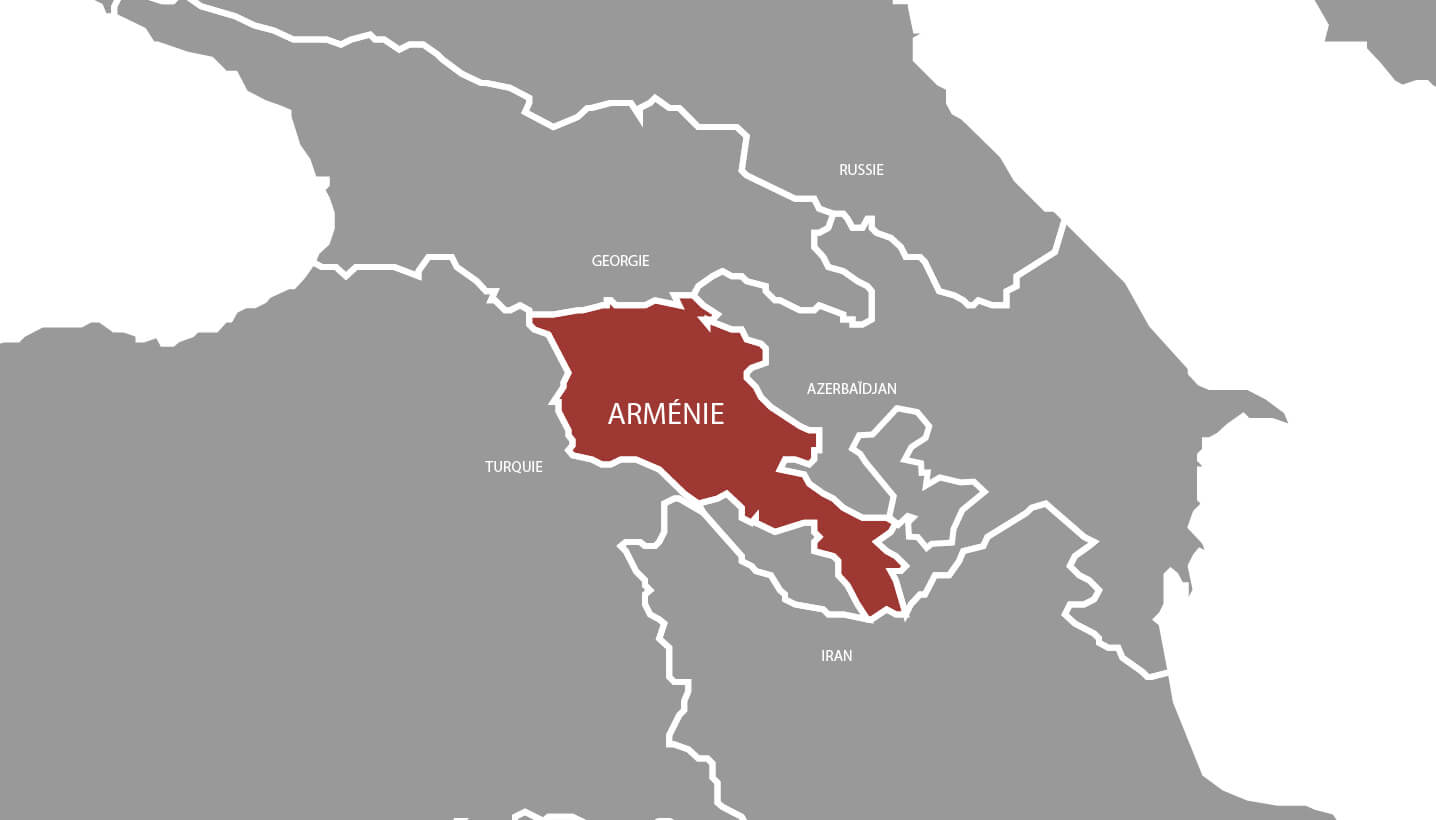

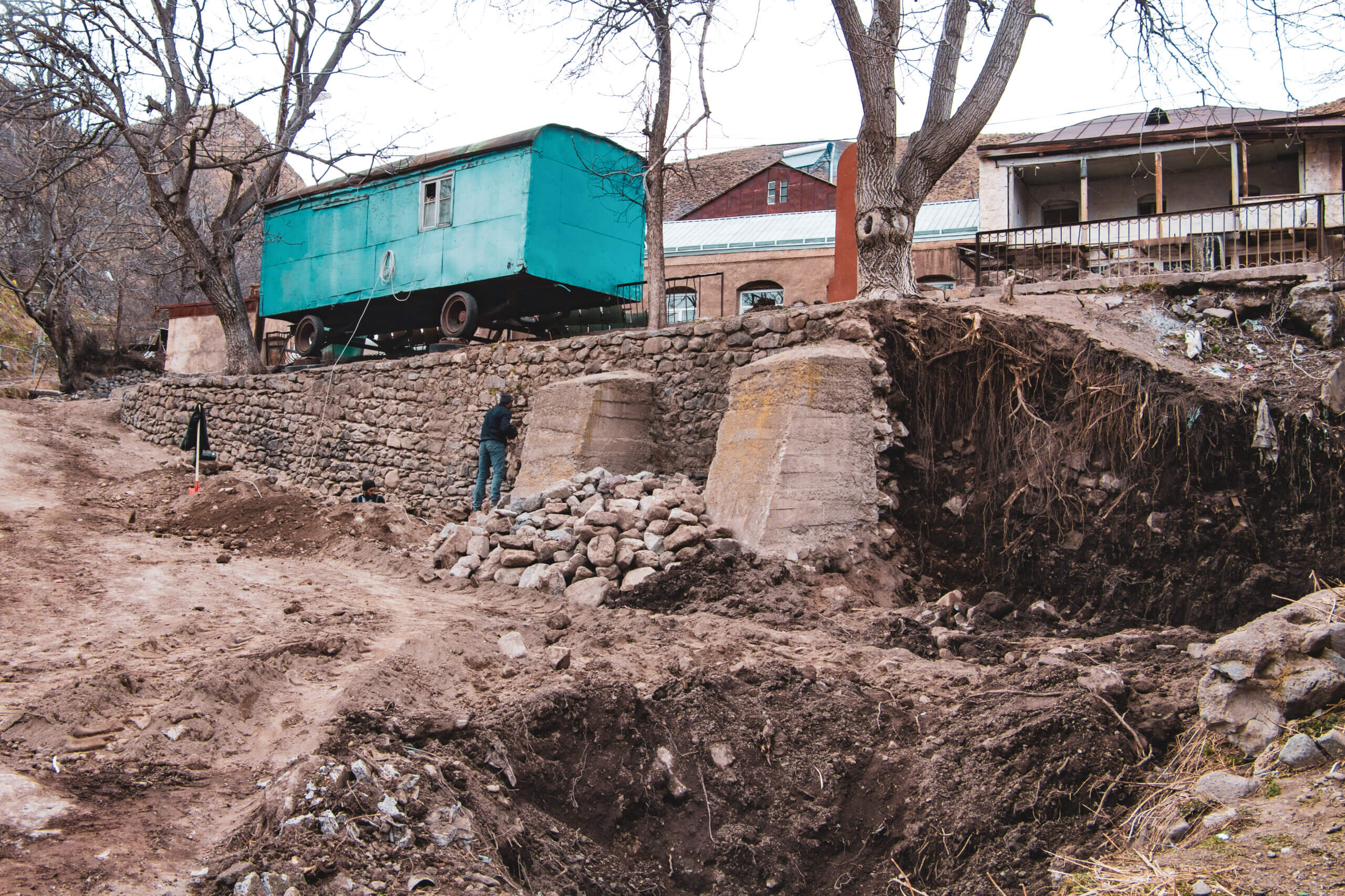
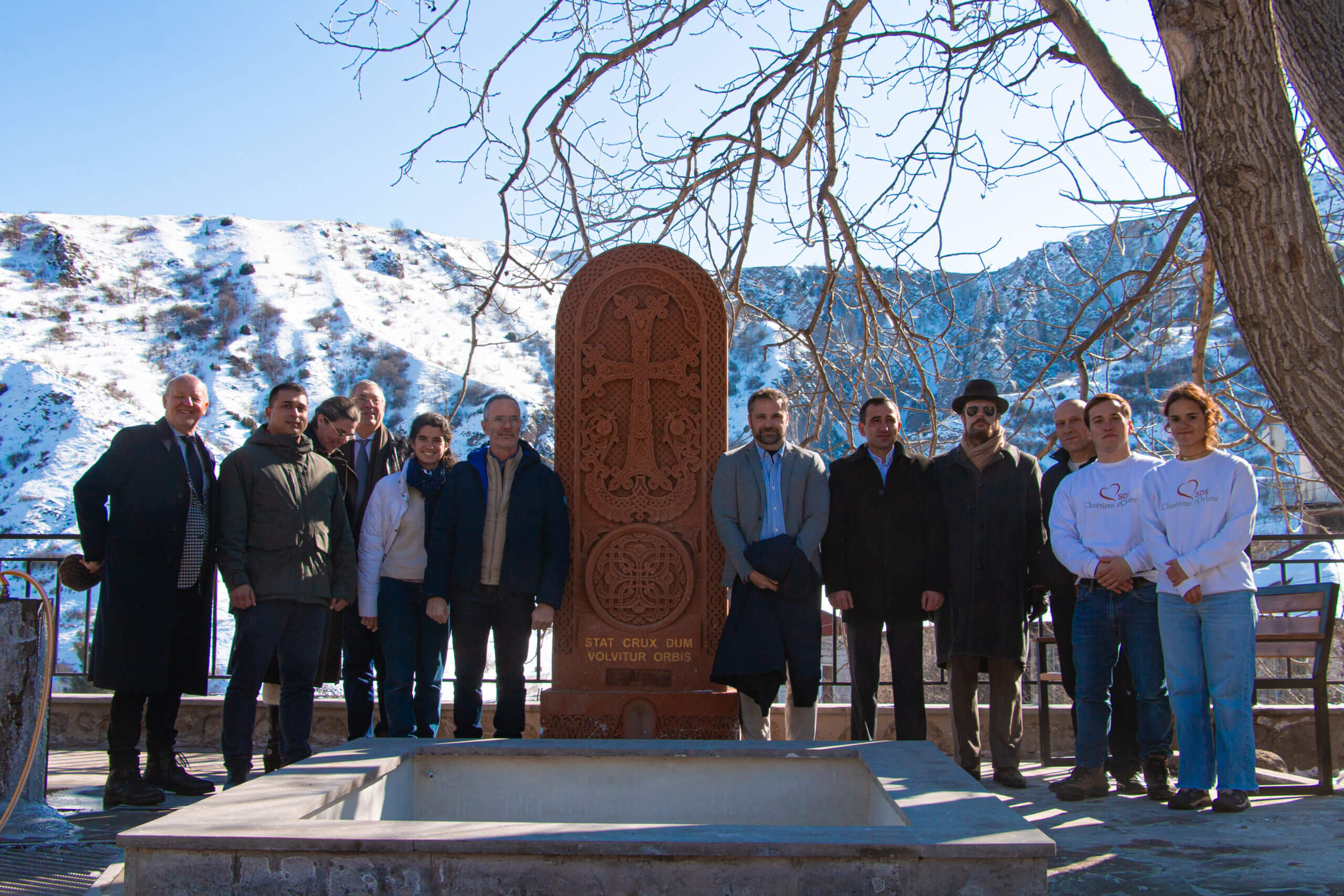
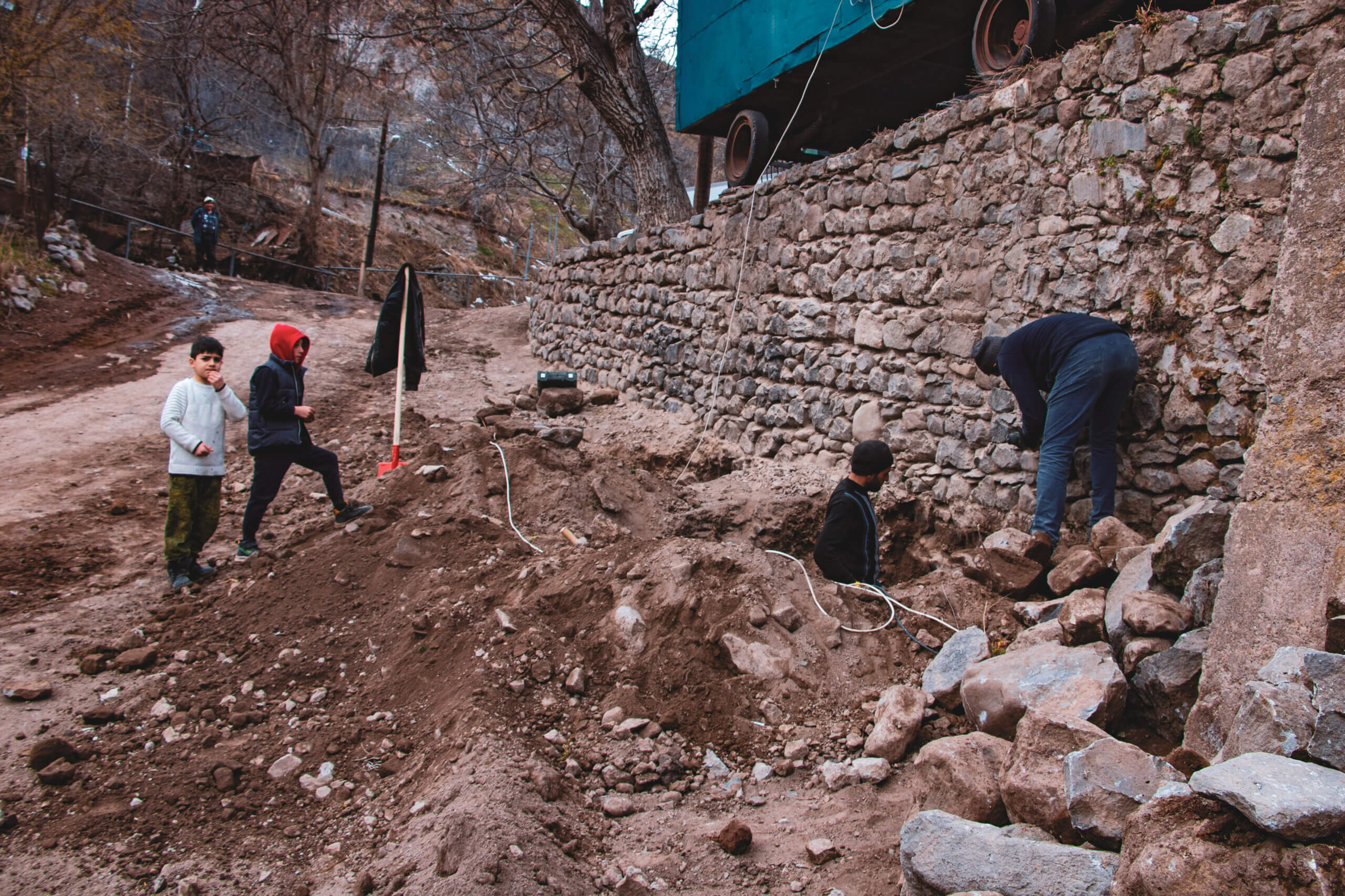
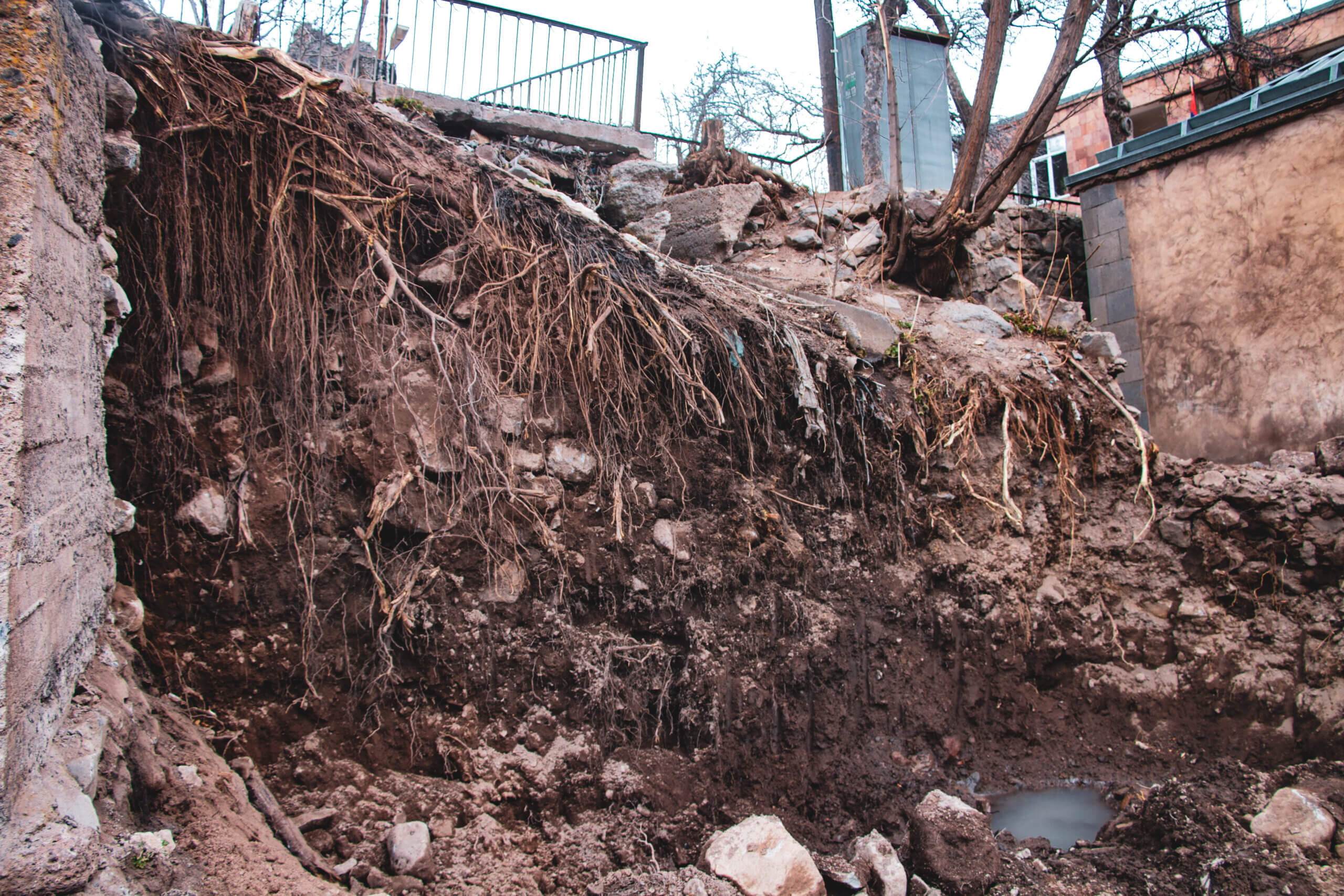
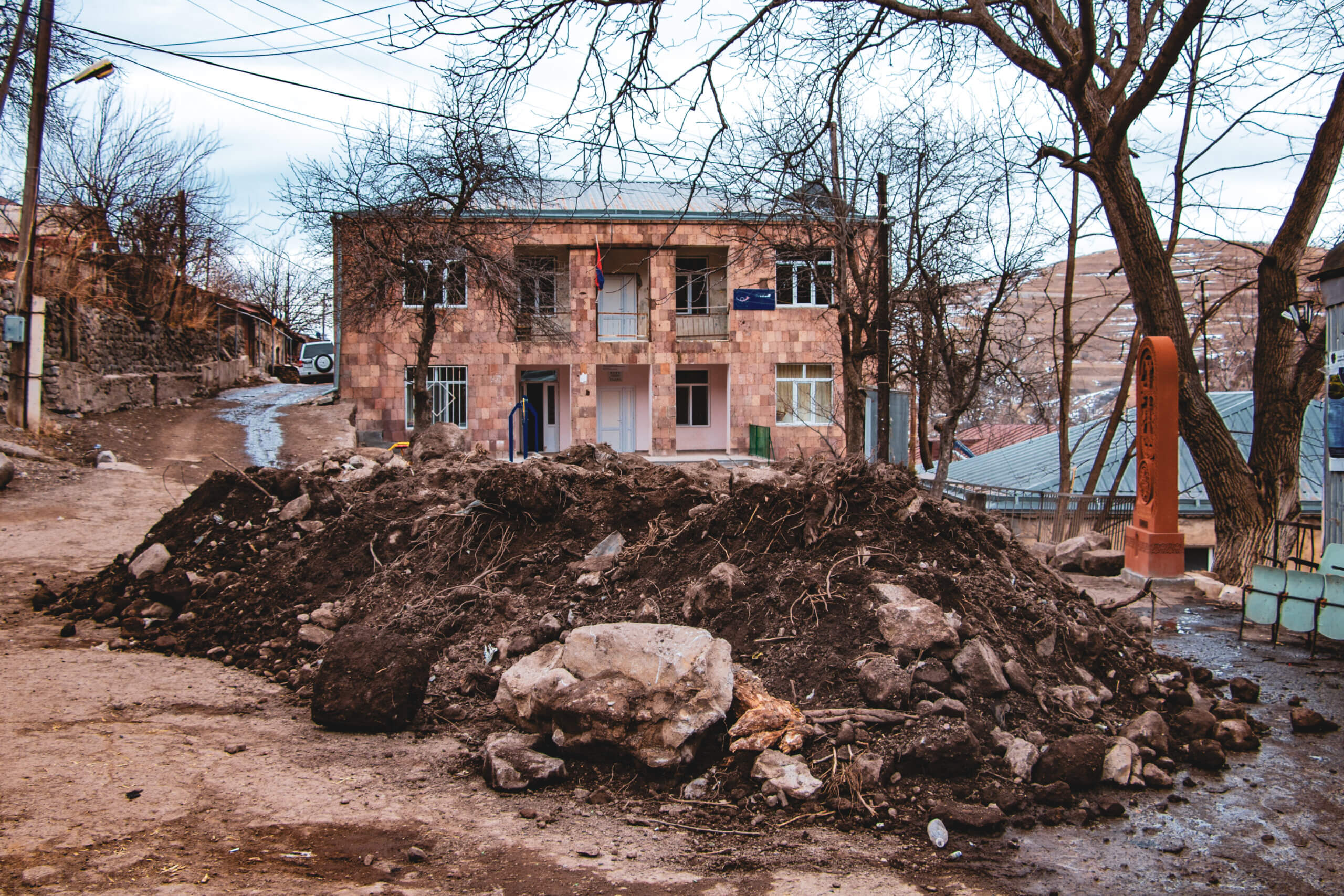
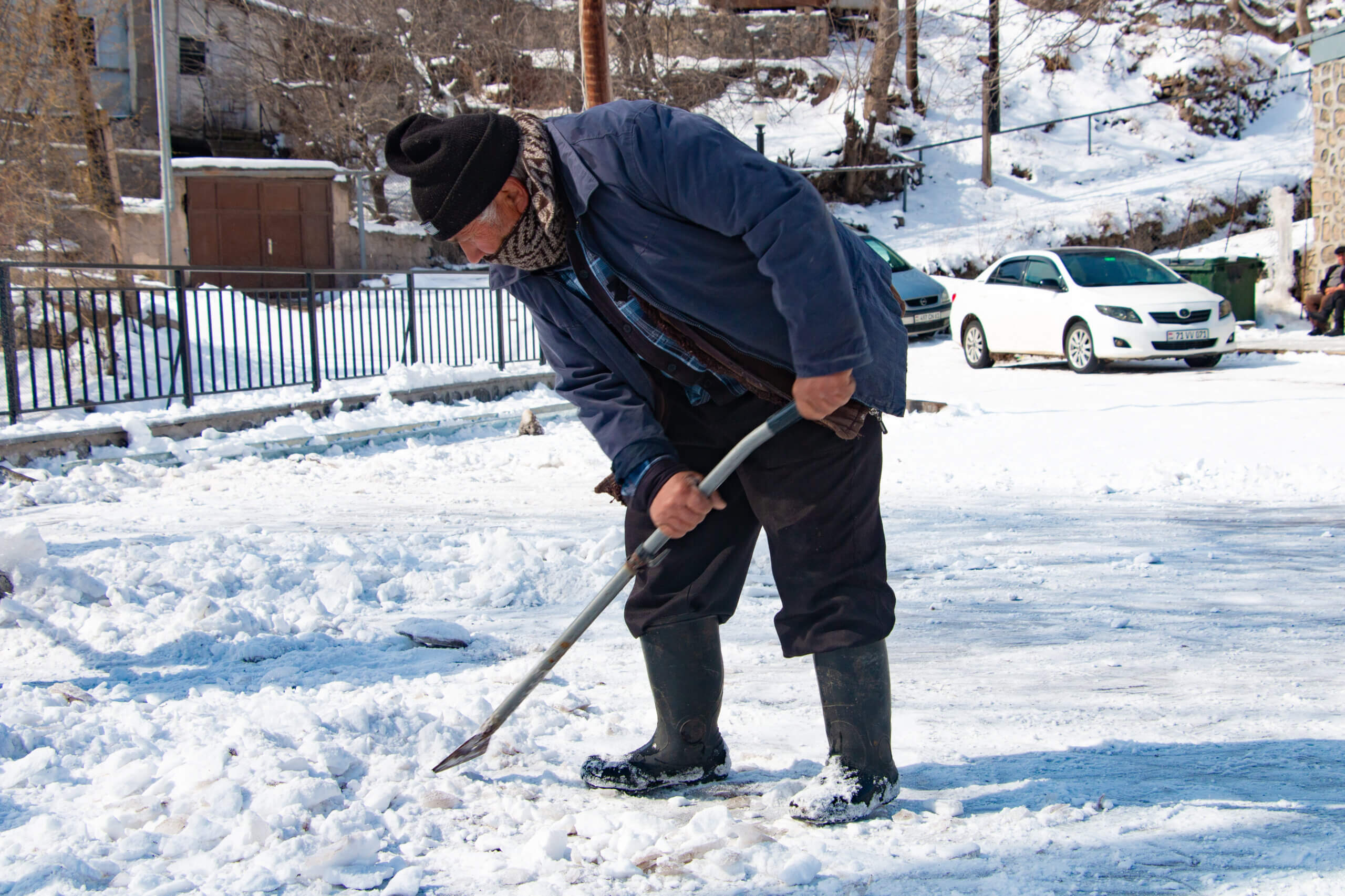
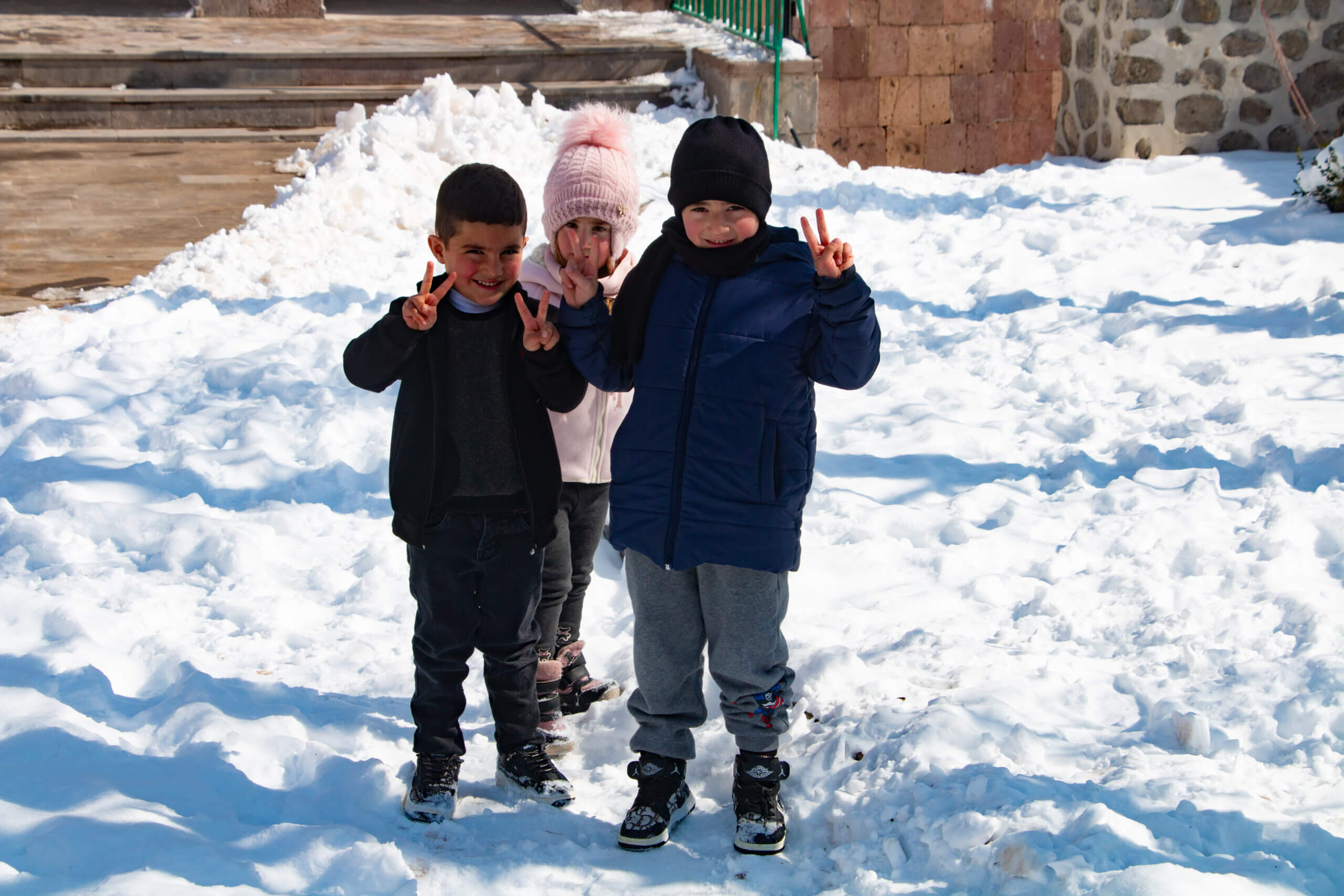
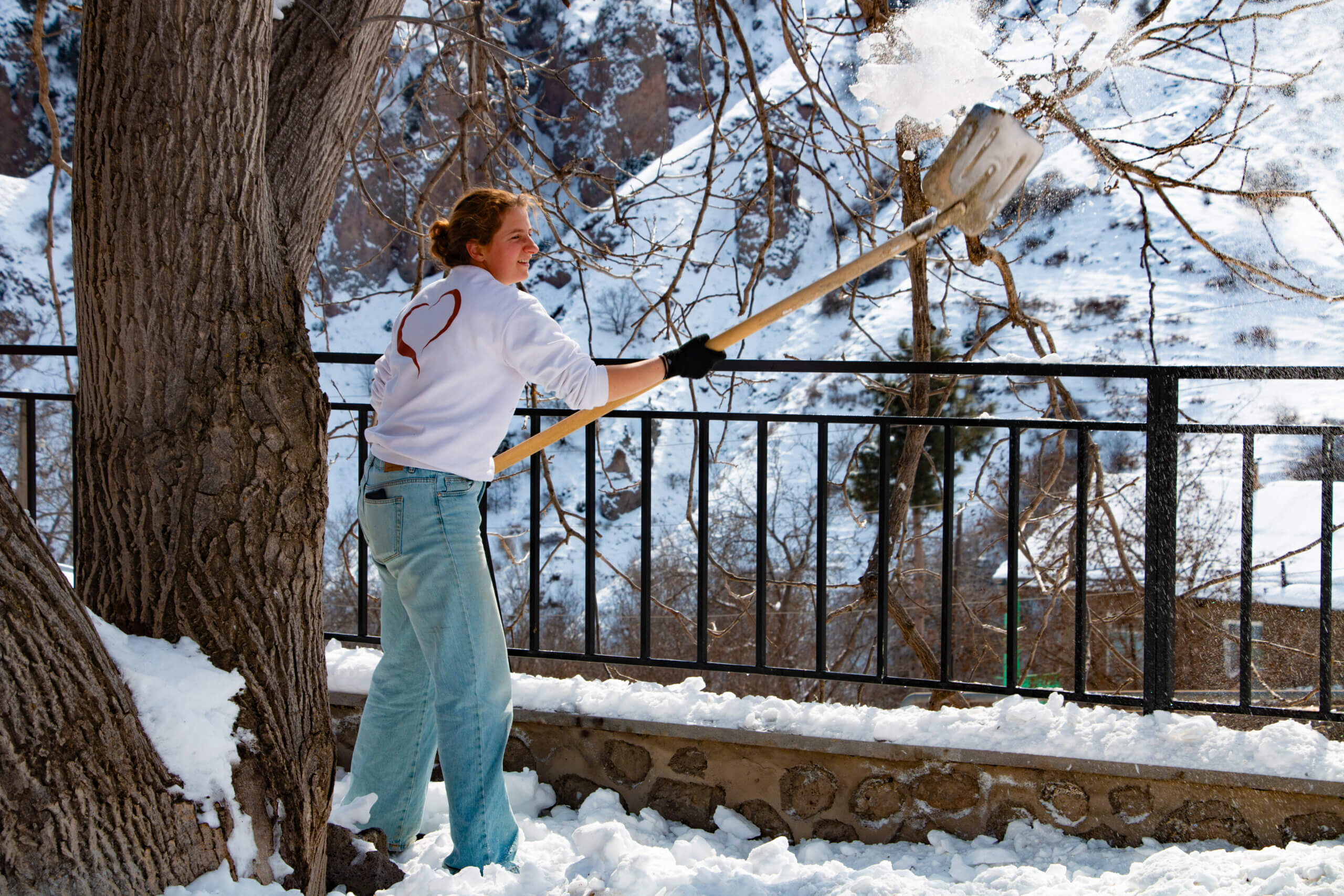
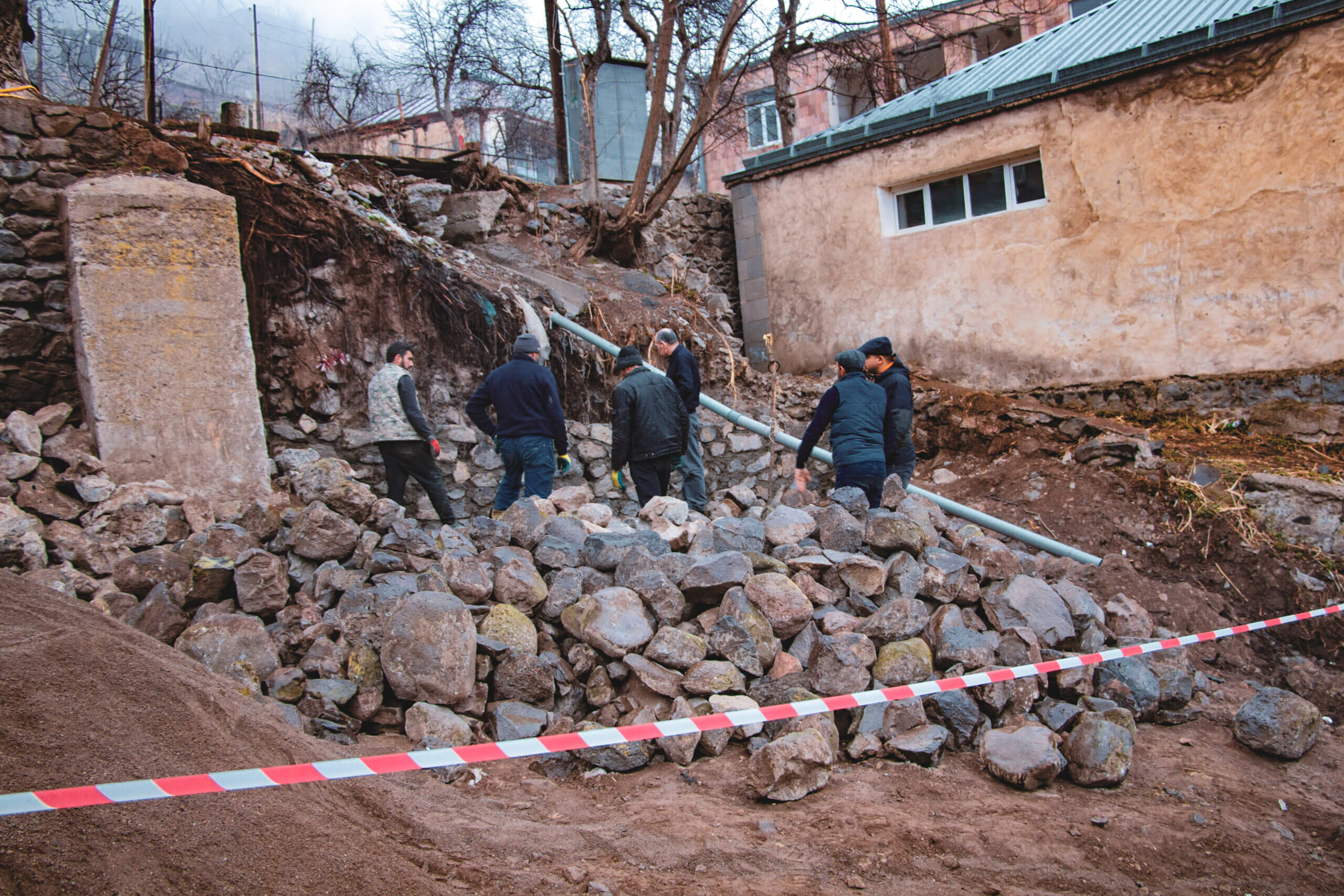
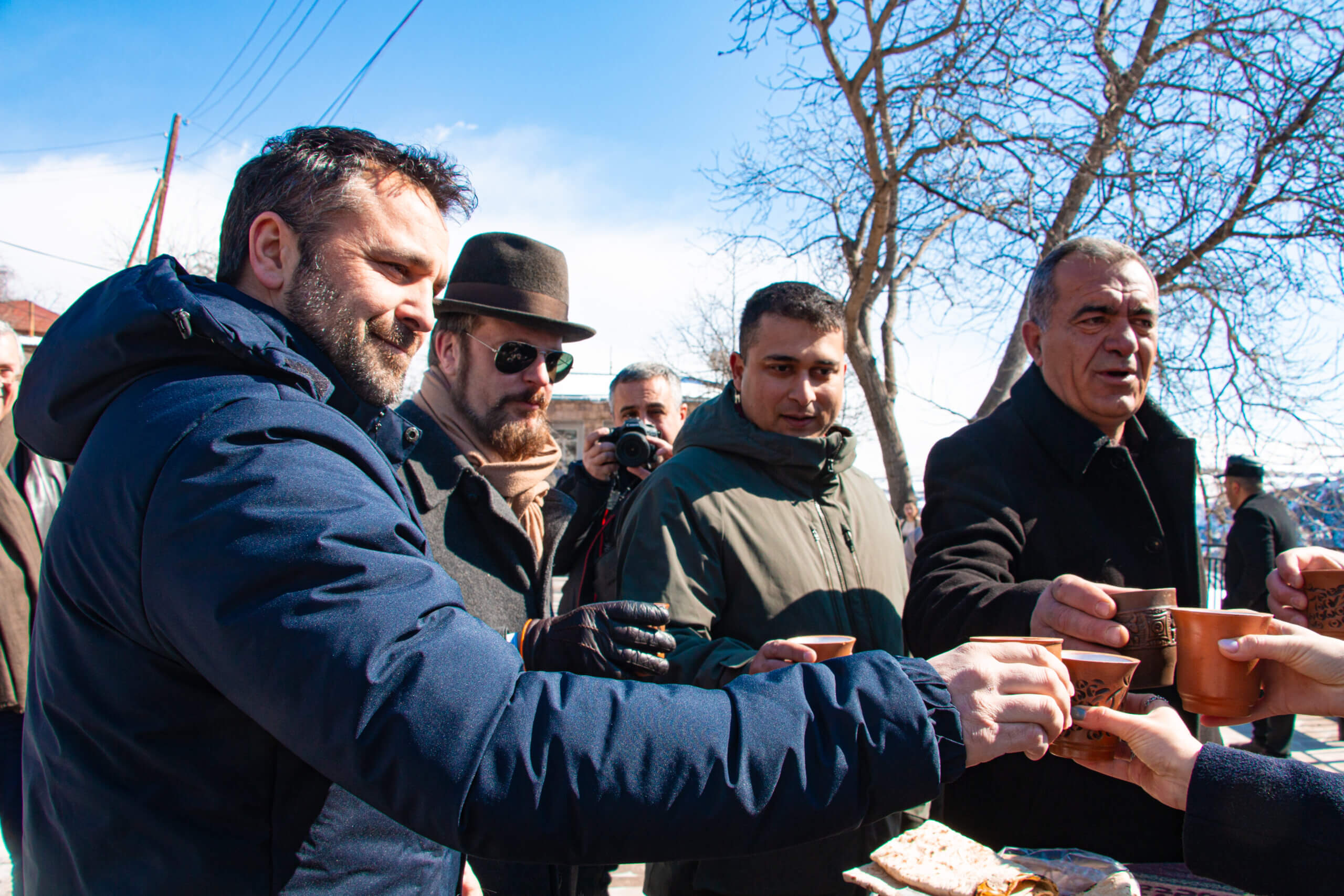
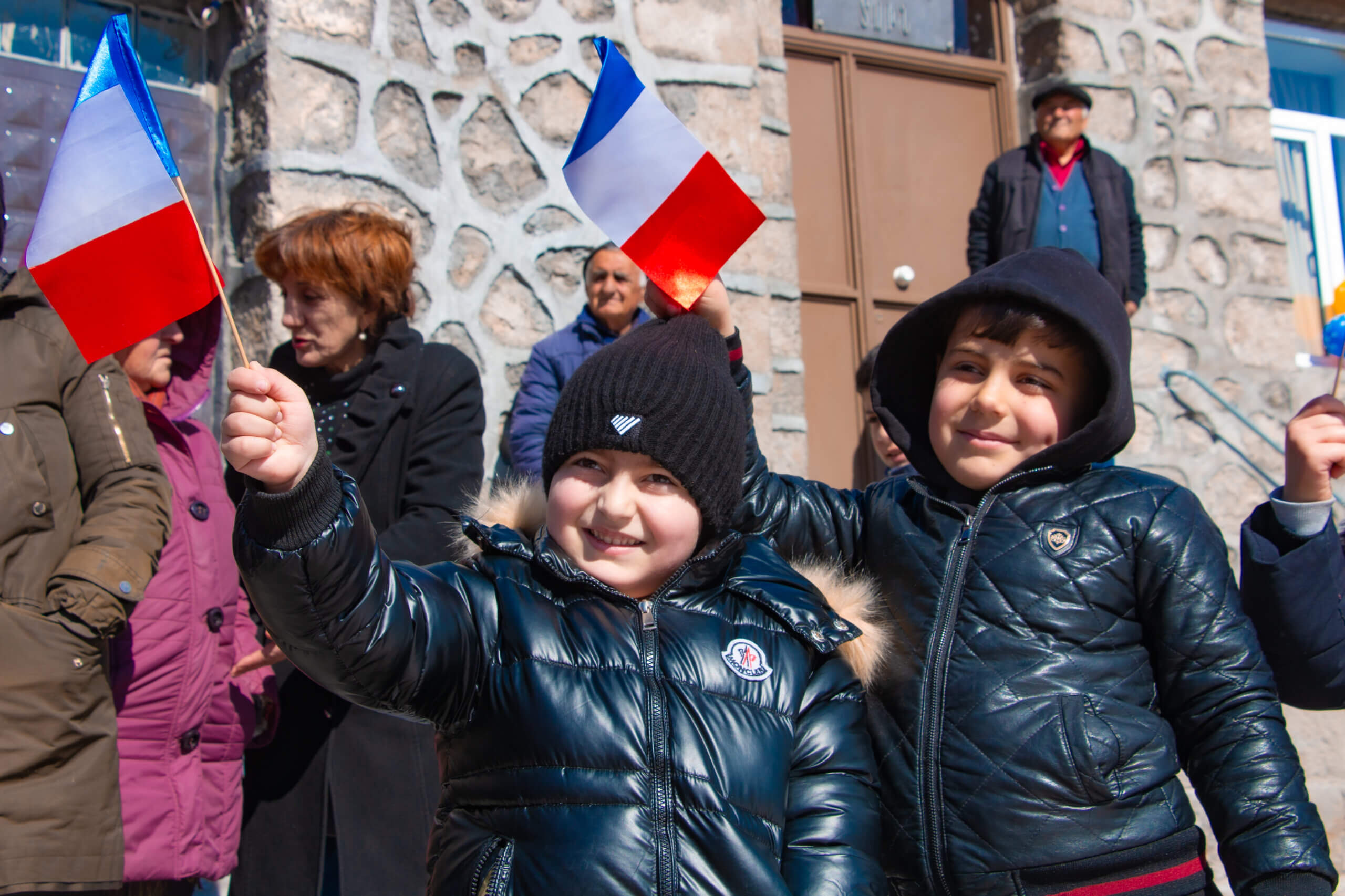
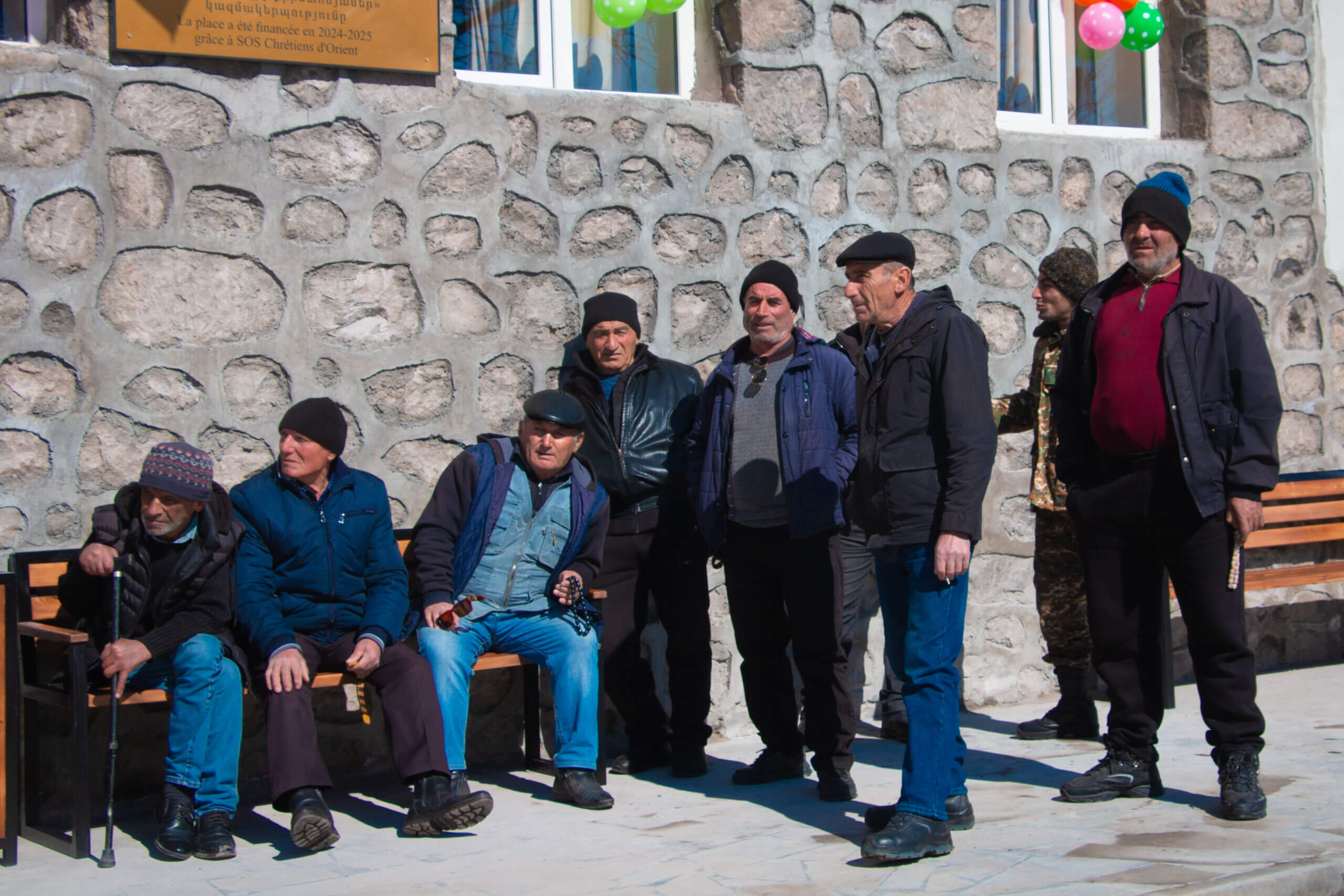
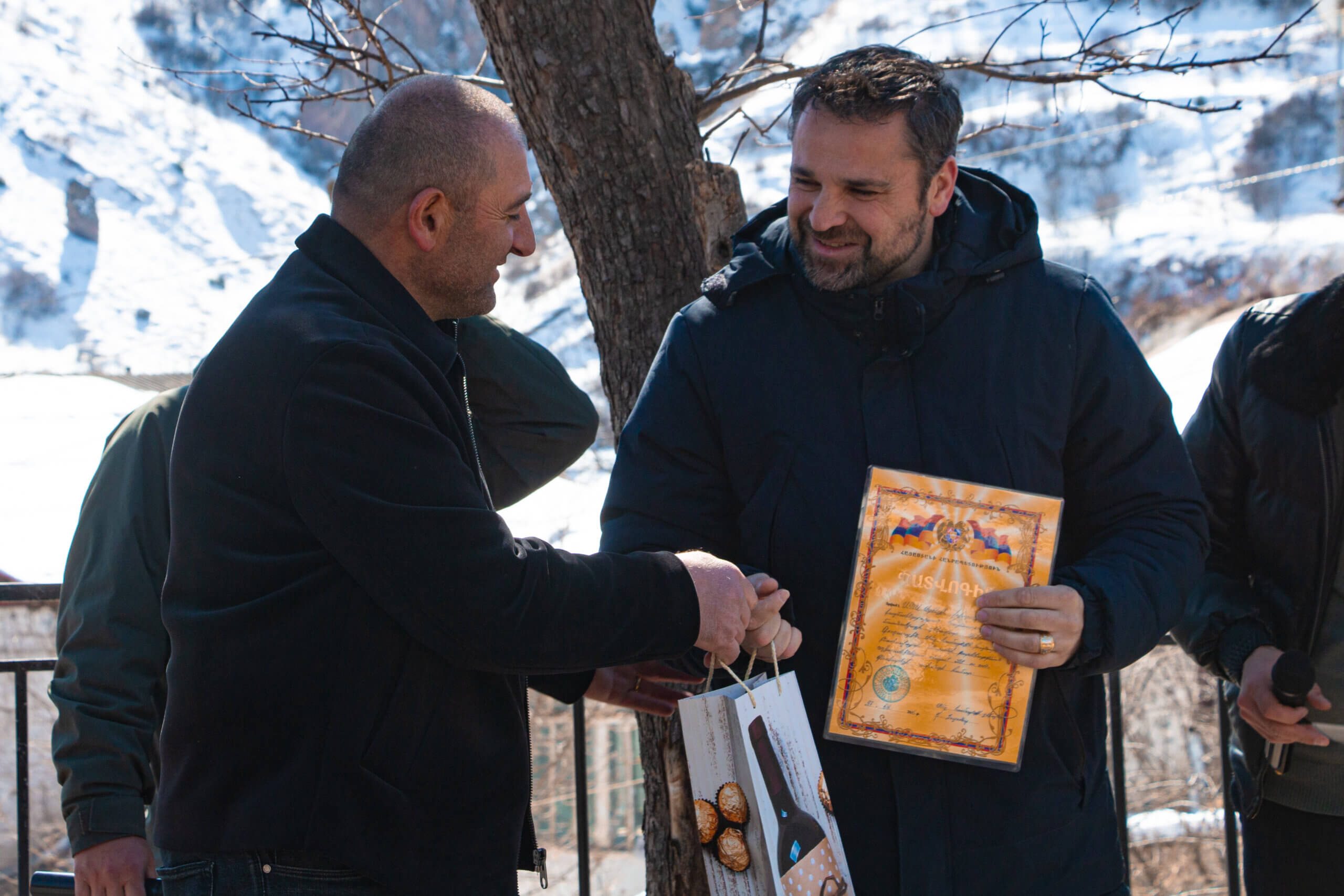
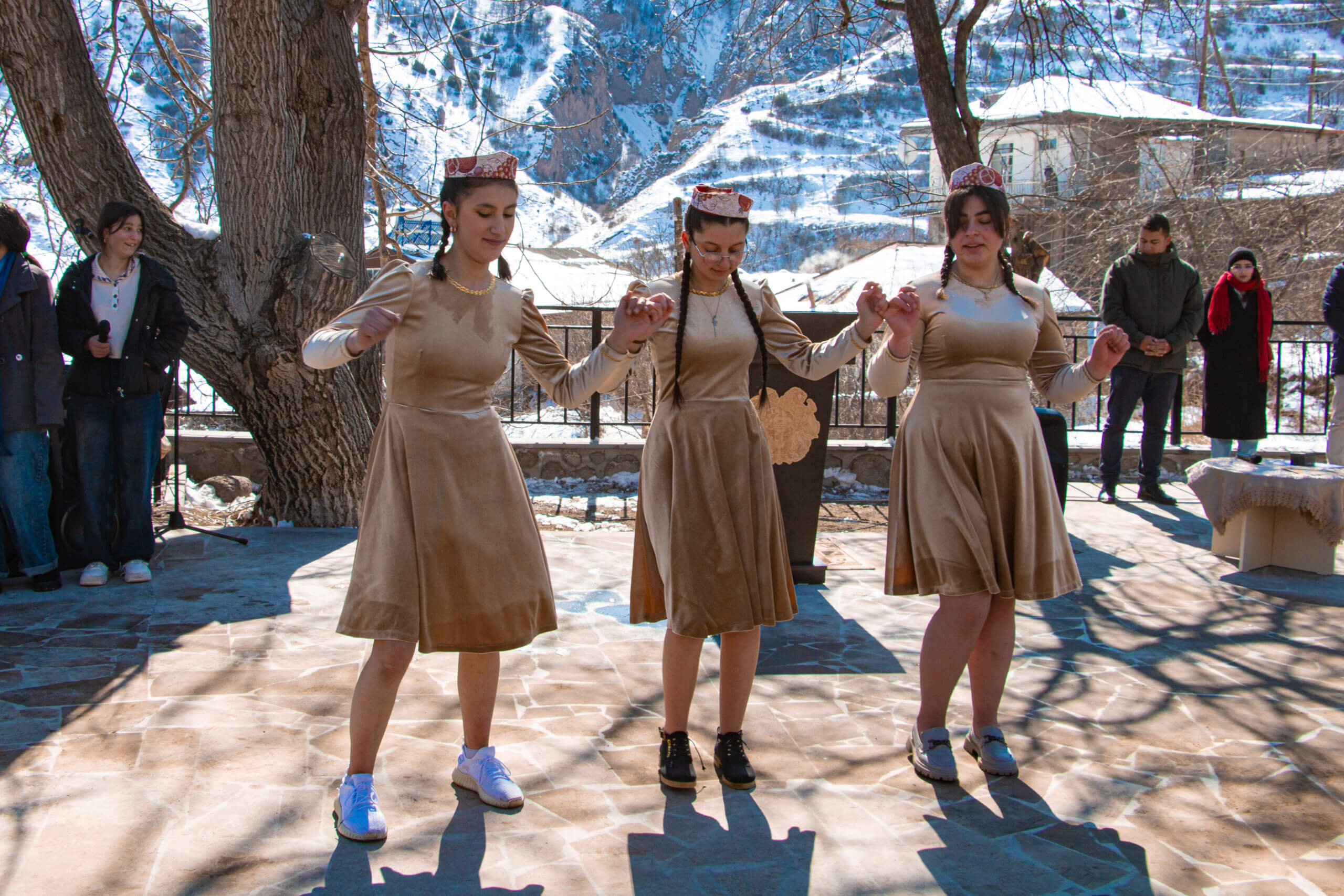
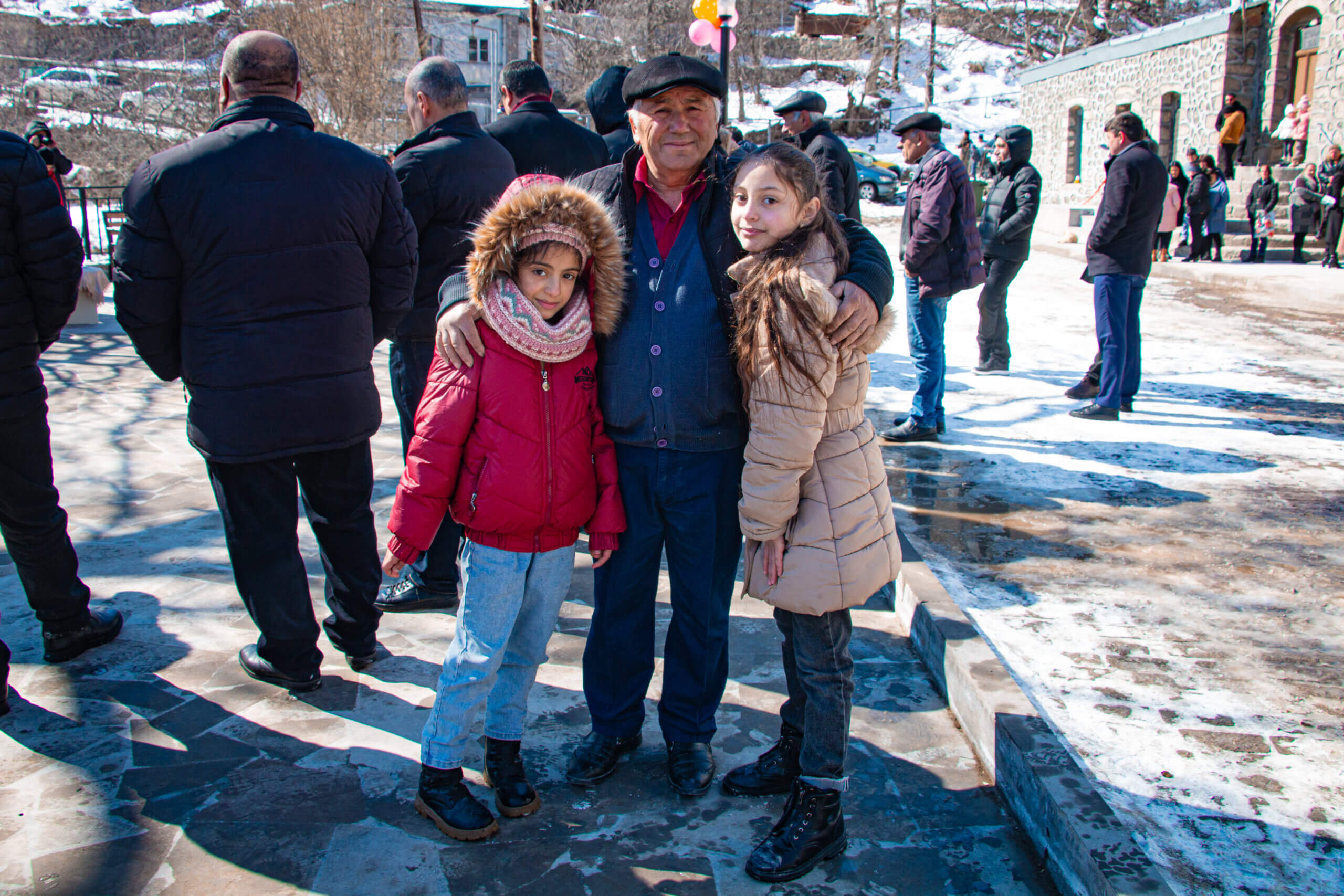
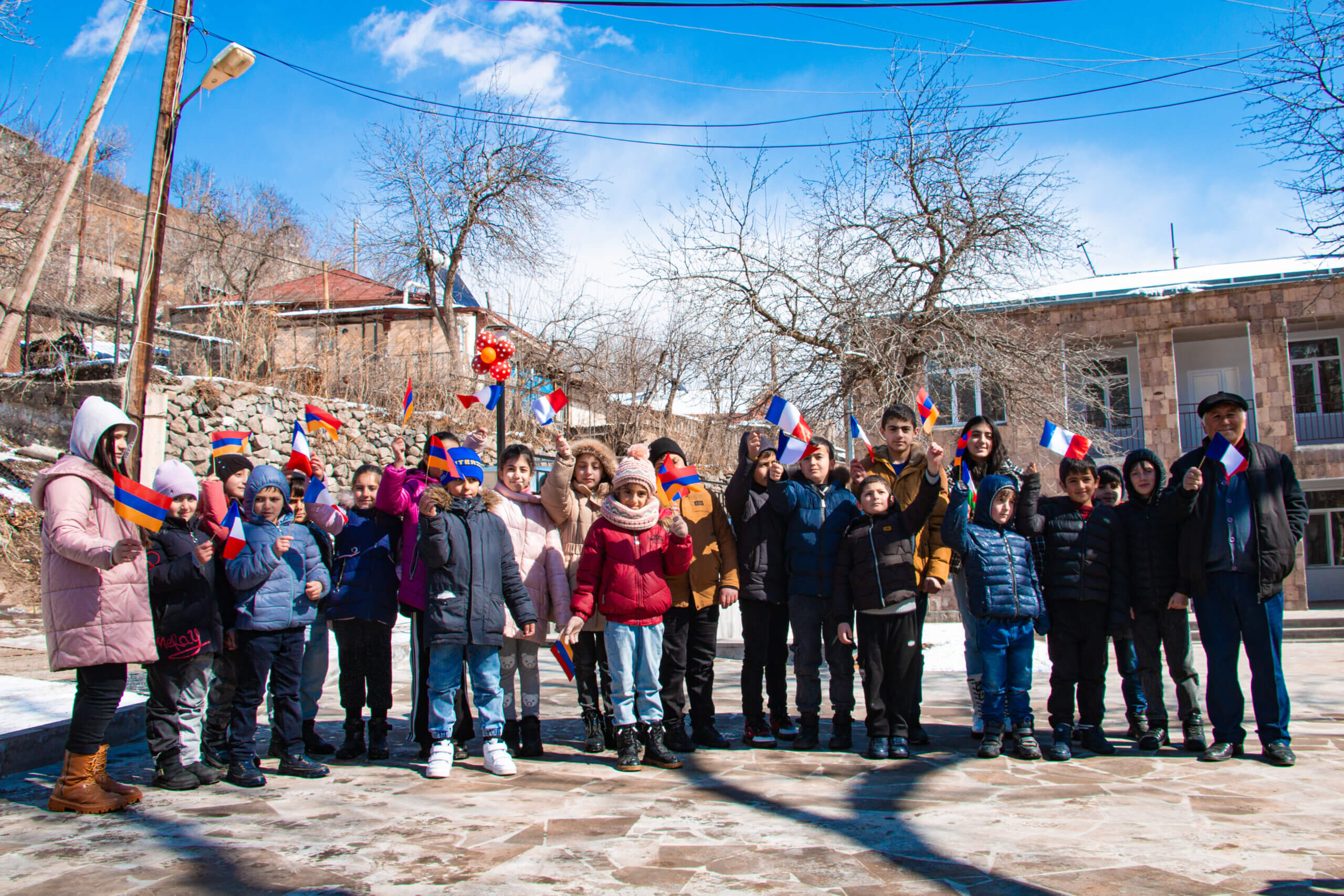
A few kilometres from Goris, not far from the front line with Azerbaijan, stands the village of Khoznavar. Isolated in the Syunik mountains, almost like an enclave, this village of 450 inhabitants lives mainly from farming and livestock rearing. The houses are built into the mountainside, and there is only one flat area where the villagers can gather: the central square.
But this square, very important to the village social life, was in a very poor state of repair. Supported by a large stone wall – a whole section of which had collapsed – it needed major consolidation and renovation work. SOS Chrétiens d’Orient answered the call of its renovation thanks to the generosity of its donors.
Today, after several months of work, Benjamin Blanchard, SOSCO’s director general, and Alexandre Goodarzy, Head of Mission in Armenia, were received by the mayor of Khoznavar and the village’s Armenian families to celebrate the inauguration.
This renovated square – with its new paving, water drainage pipes, public benches, lighting, columns, basalt staircase and fence – now offers a convivial space worthy of the name. A cultural building adjoining the square houses a theatre and a number of communal rooms, all of which serve to strengthen the ties between residents.
During the inauguration, Armenian traditions take centre stage: local wine, honey, speeches and a folk dance performed by three young girls dressed in traditional costumes. The feast that followed, simple and generous, once again bore witness to Armenian hospitality. The toasts – the famous genatz – burst forth in honour of friendship and the future.
In an uncertain security context, where isolation sometimes drives people into exile, this project is a gesture of putting down roots, an affirmation that Armenia is being built, stone by stone, on its historic land.
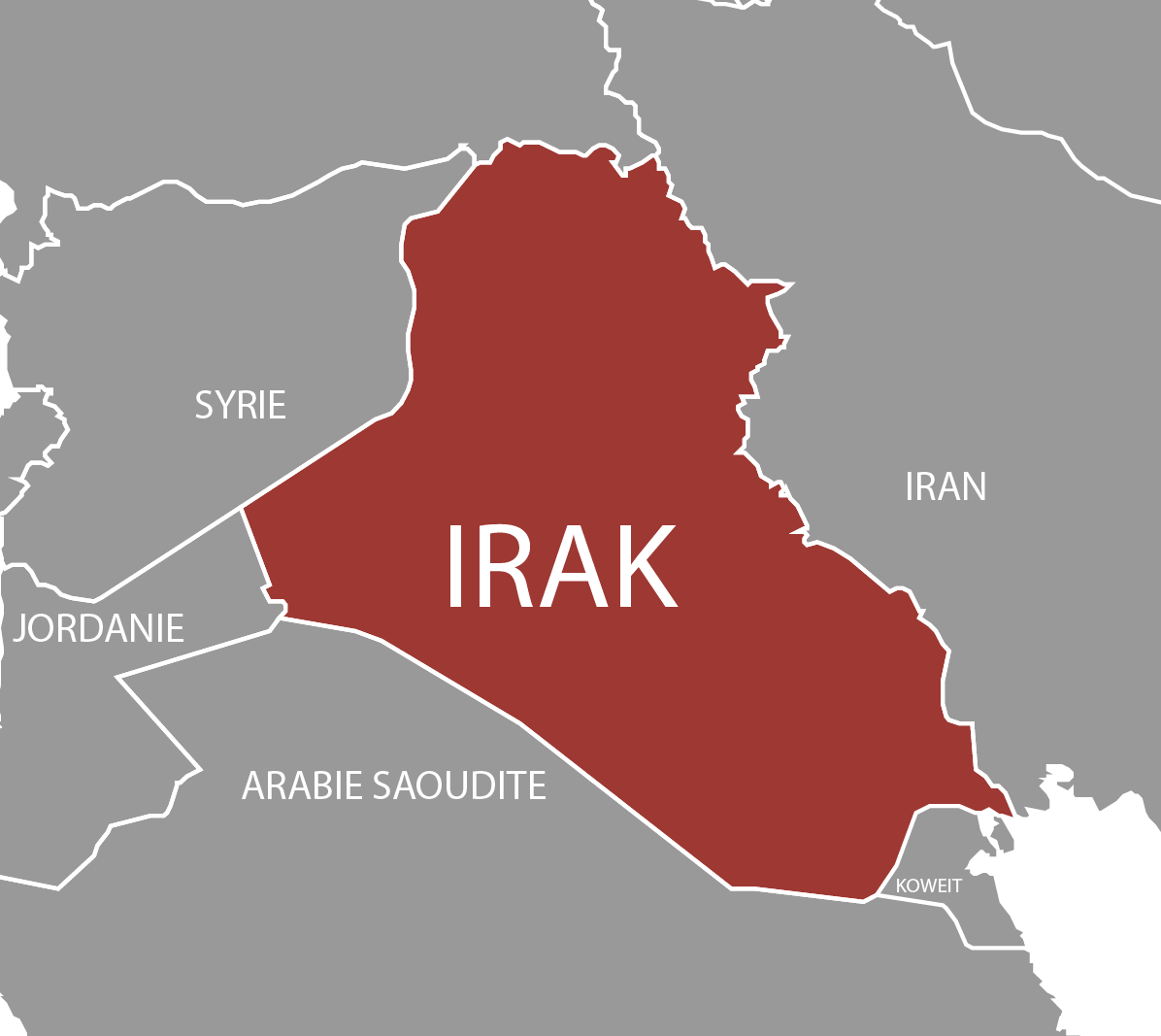

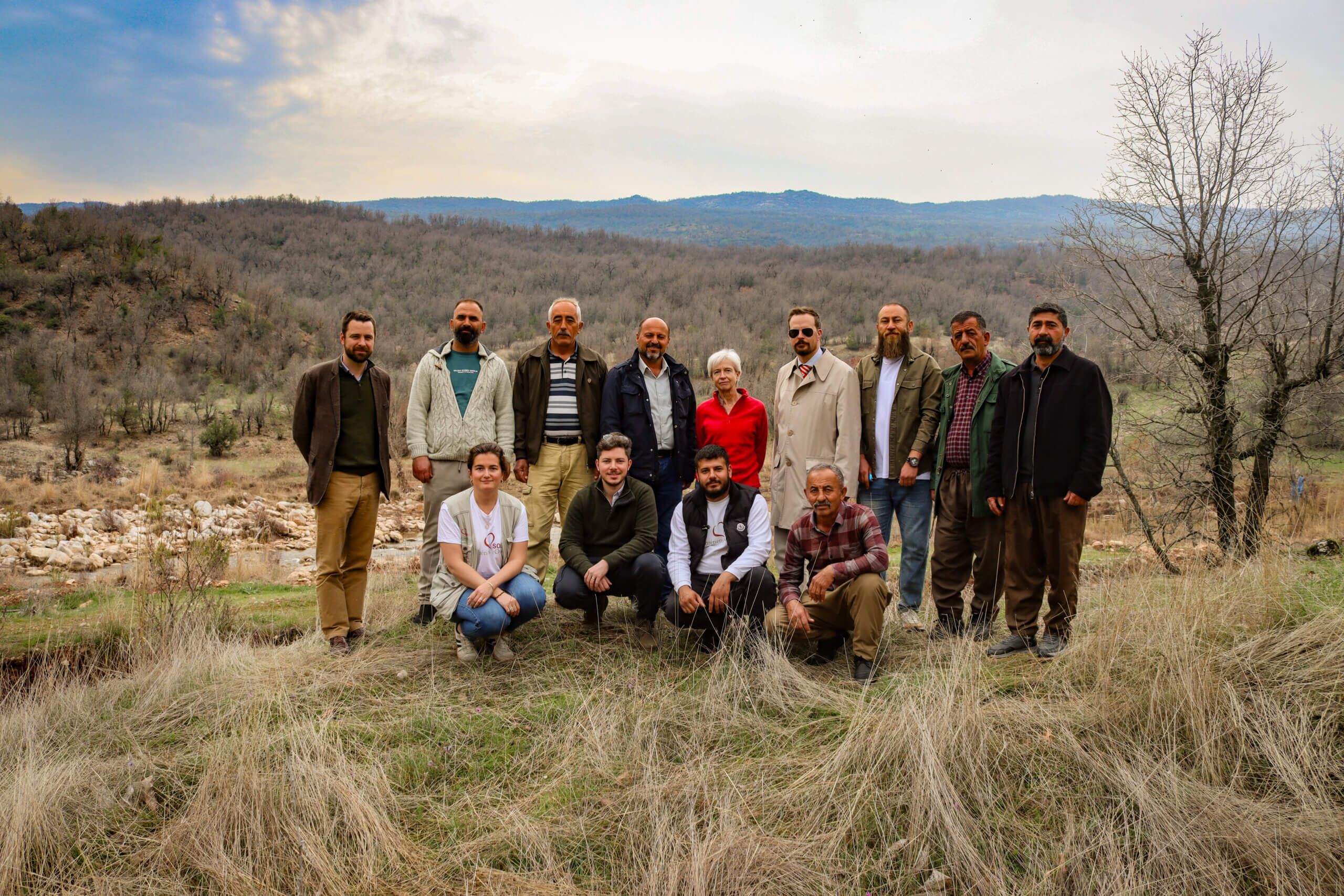
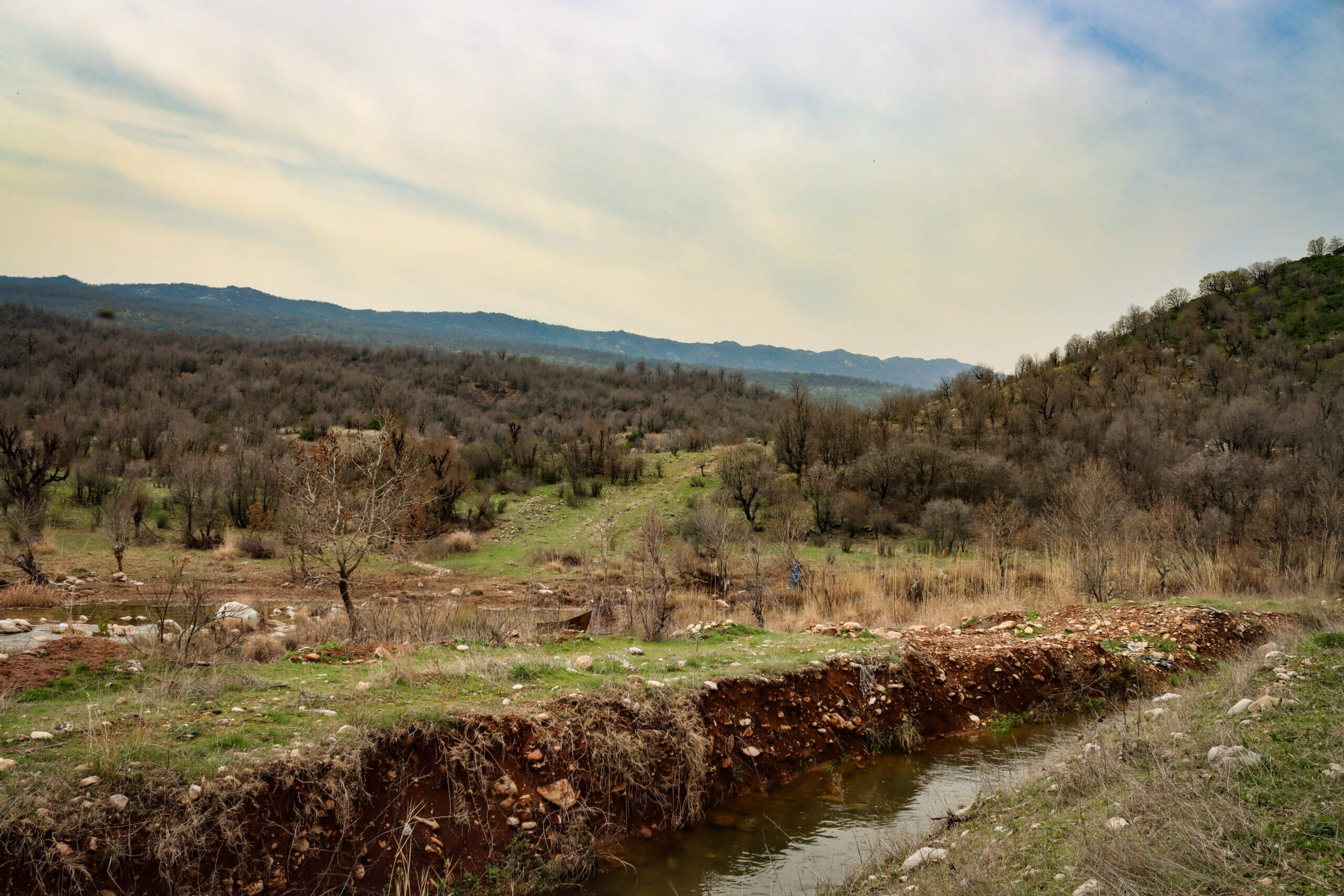
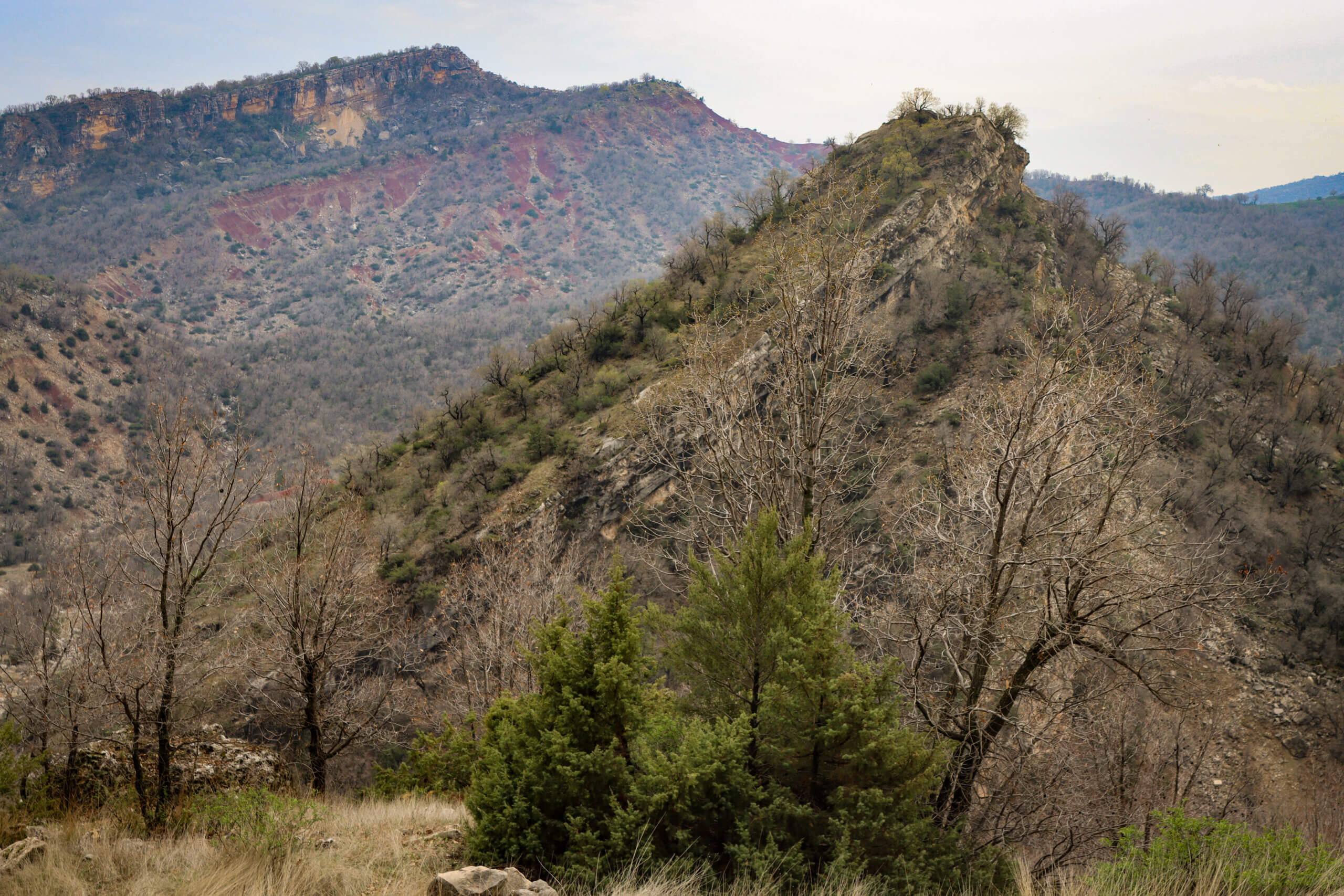
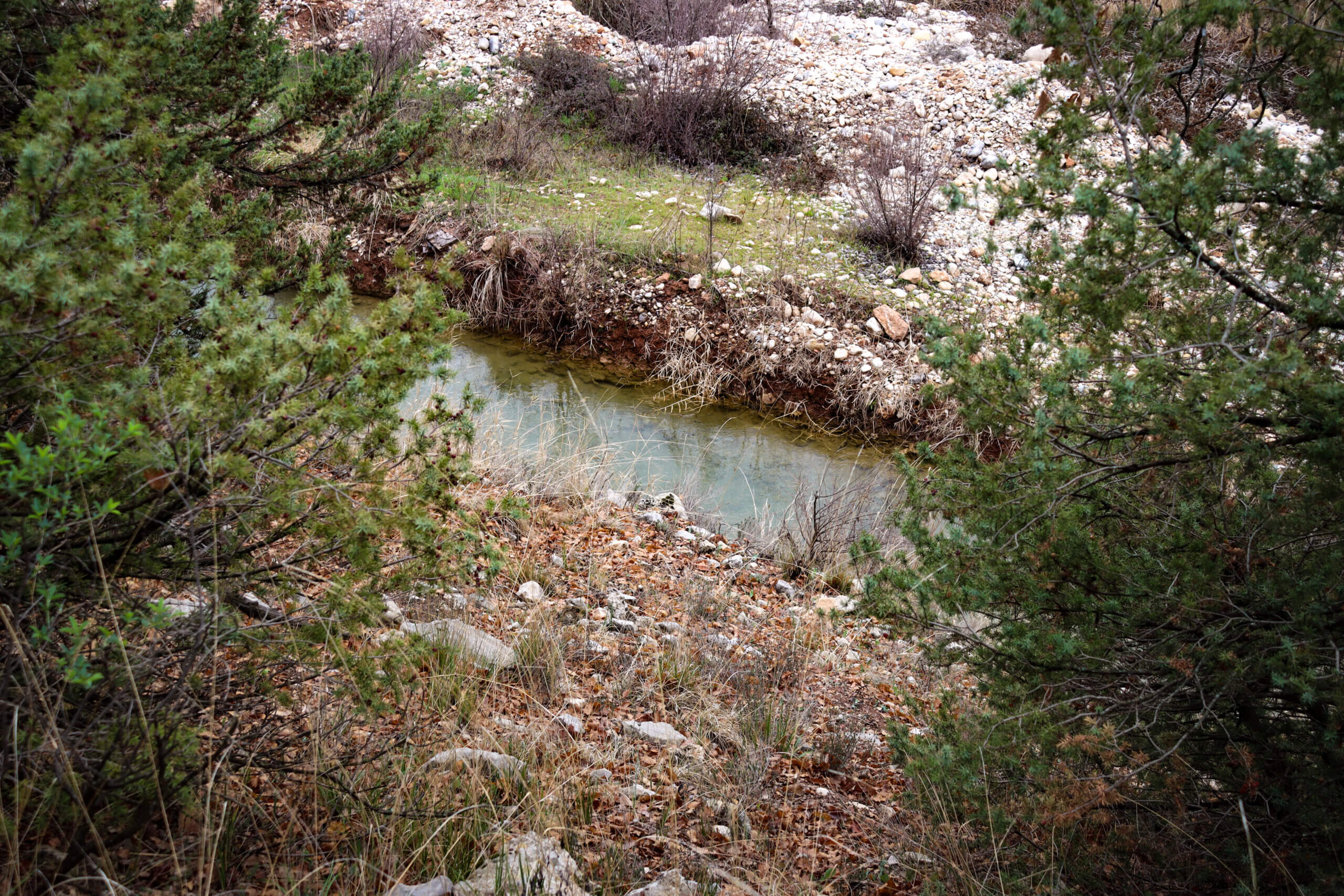
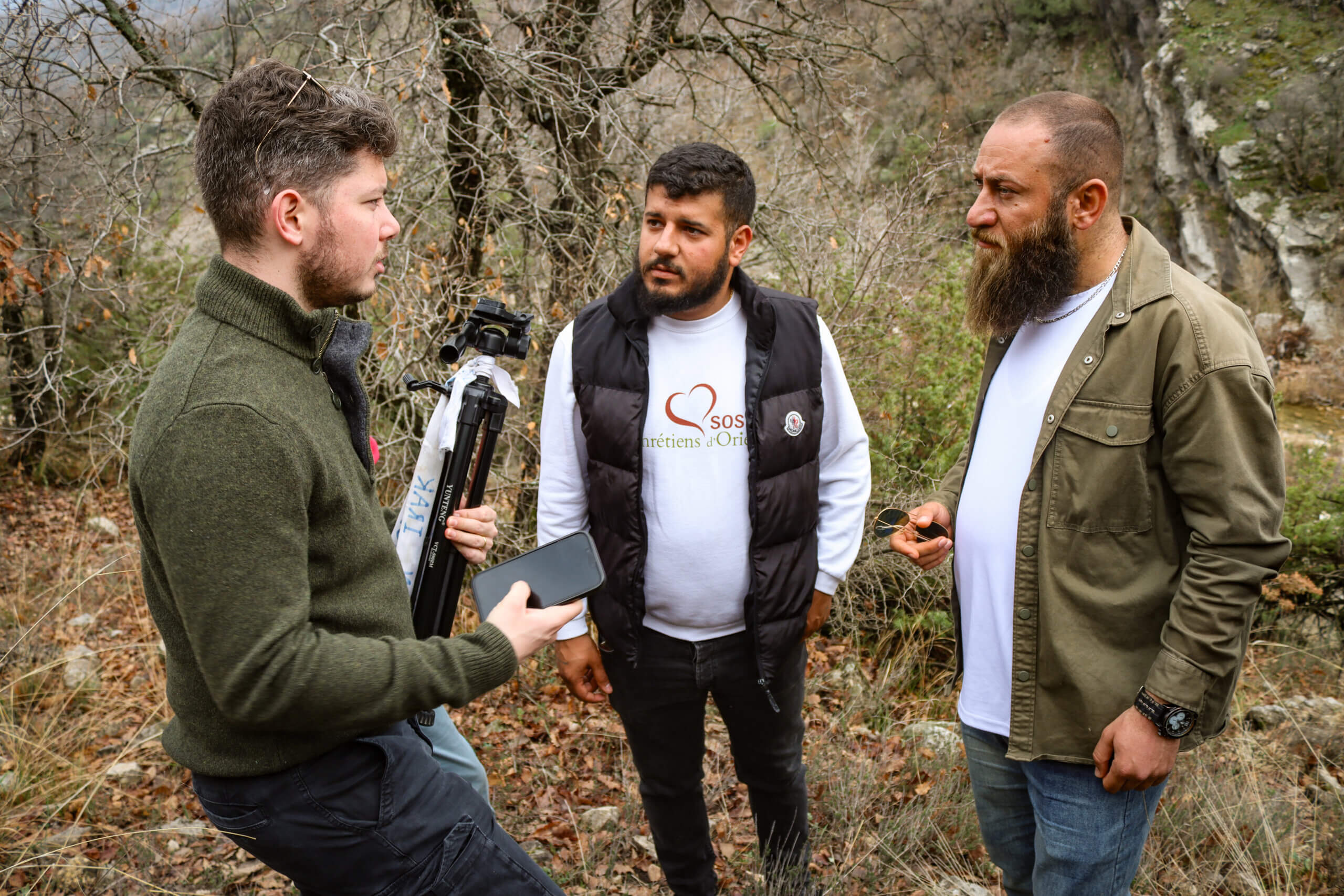
Benjamin Blanchard, Director General of SOS Chrétiens d’Orient, and Jean Vallier, Director of Communications, visit the site of the project to renovate 500 metres of the irrigation canal that supplies water to the farmland in the Nahla Valley.
“Our noses pressed up against the car window, we didn’t want to miss any of the raw beauty that lay before our eyes: majestic mountains, endless plains, nature still in its wild state. After a few steep bends, we reach the meeting point. A group of men was waiting for us: representatives of the village of Nahla, nestling in the heart of the valley holding the same name.
The greetings are warm: handshakes, hugs, and then we set off, guided by our hosts, through a dense, silent forest. The path was steep and lined with pine trees, it winds up the side of the mountain. Below us, a stream sparkles between the rocks.
A farmer tells us that the valley is home to seven Christian villages, populated by Assyrian families who have lived here for four generations. Their ancestors fled the massacres perpetrated by the Ottomans during and after the First World War, seeking refuge in this fertile land.
After a twenty-minute walk, we reach a promontory with a breathtaking view of the river below. The village chief, or the Mokhtar, explained that this water irrigates the farmland of the seven surrounding villages. But the irrigation canal, built decades ago, is now too dilapidated. Poorly maintained and cracked in some places, it no longer distributes the water fairly. The rest flows freely, exposed to droughts, floods and natural blockages.
Therefore, the project’s purpose became obvious: to channel all this water in a sustainable way so as to guarantee a regular, long-term supply for everyone.
Seven kilometres to be rehabilitated, to guarantee the economic survival of seven villages. A project that is simple in its objective, but immense in its repercussions.
At the end of the visit, the villagers invited us to lunch. True to legendary Iraqi hospitality, they welcomed us like brothers. Dolma, fragrant rice, roast chicken, herb soup… We even have the honour of tasting their own rice and yoghurt.
We leave the Nahla Valley with our hearts full of joy. No need for introductions, we know each other now. A solid, sincere relationship has been forged. And as we leave, one thing is clear: these families deserve much more than our help. They deserve our lasting commitment. The next time we visit, the work will have begun. This thought alone is enough to nourish our hope.
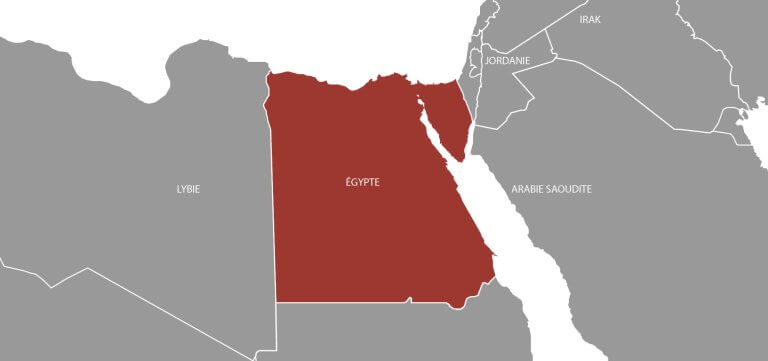

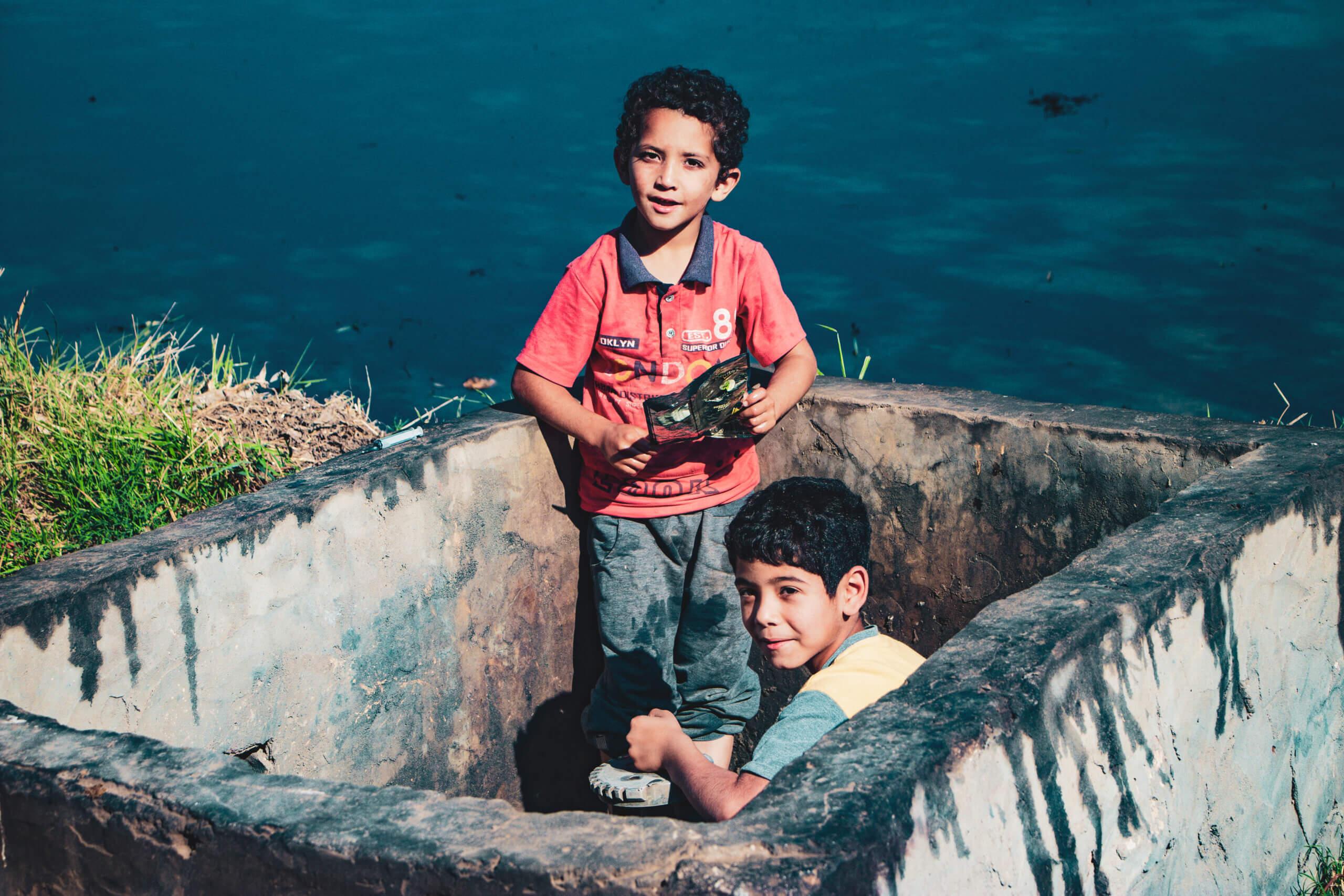
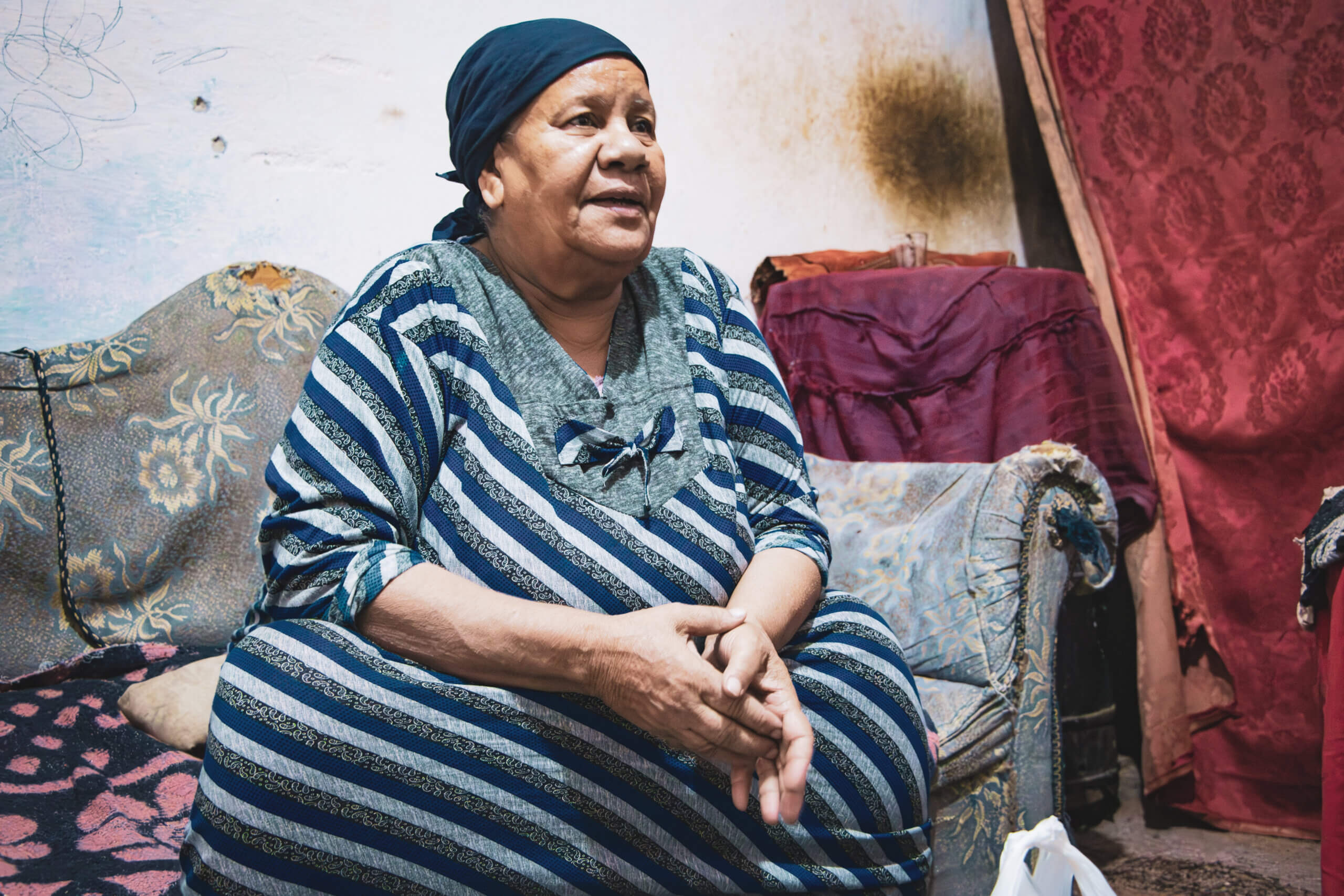
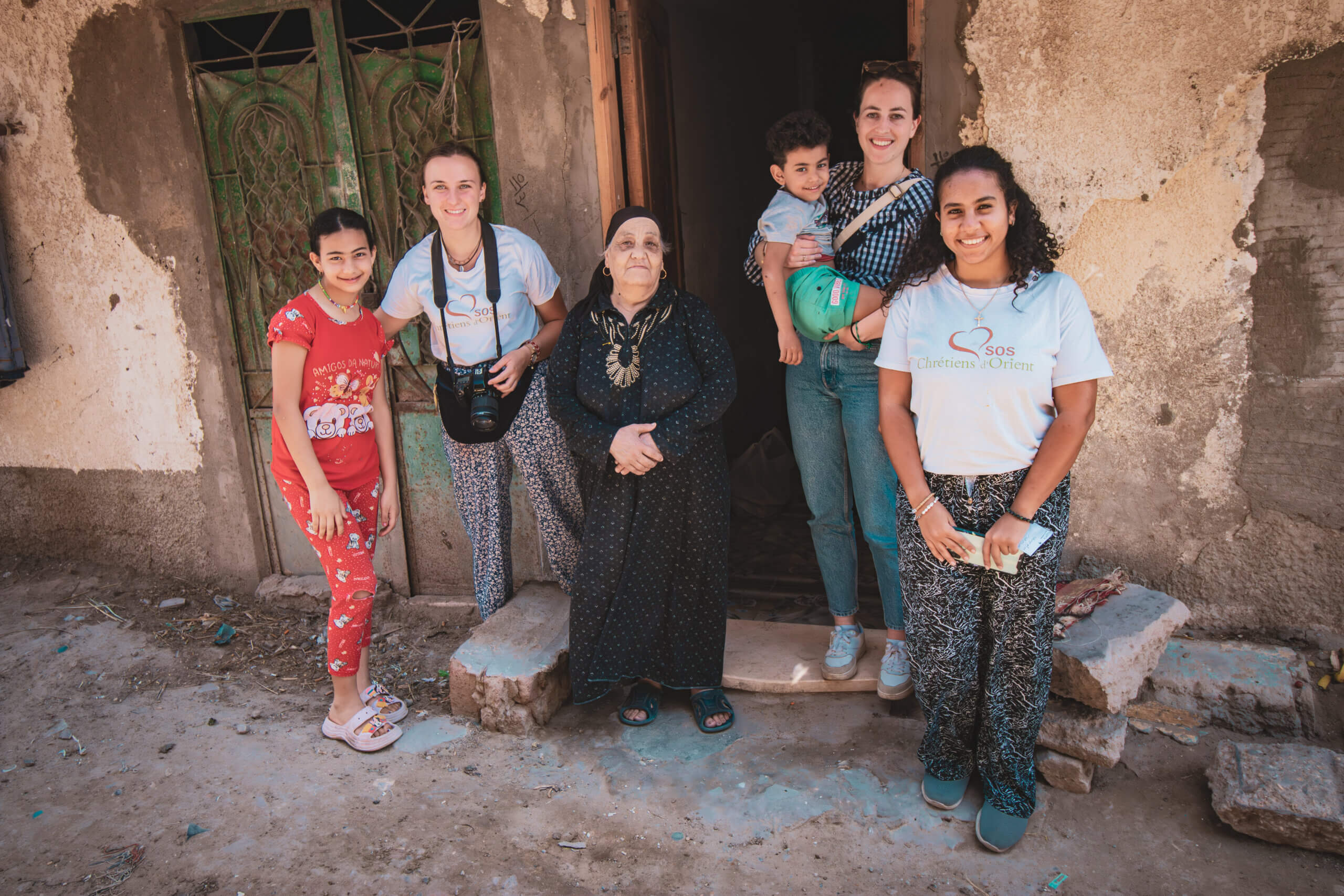
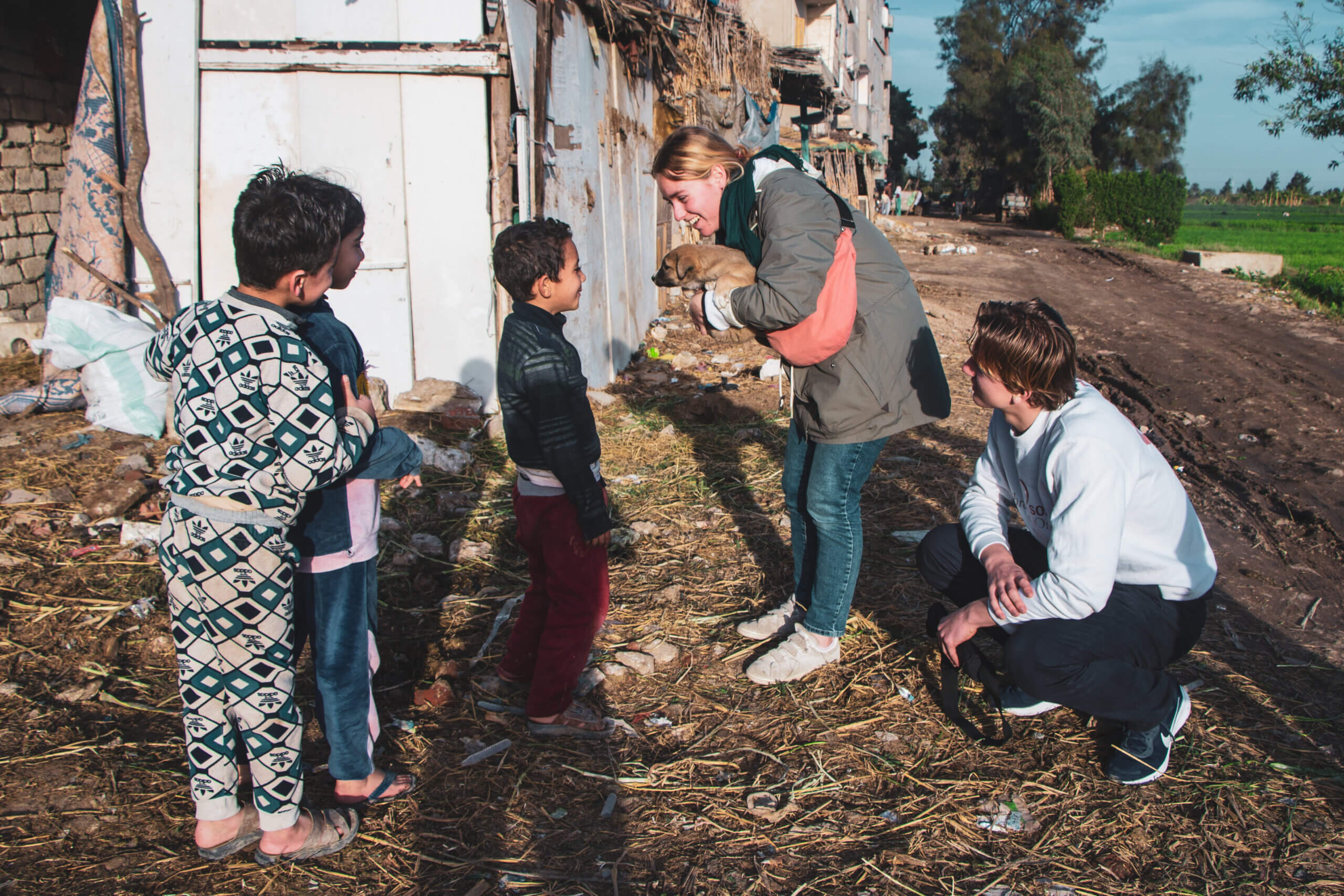
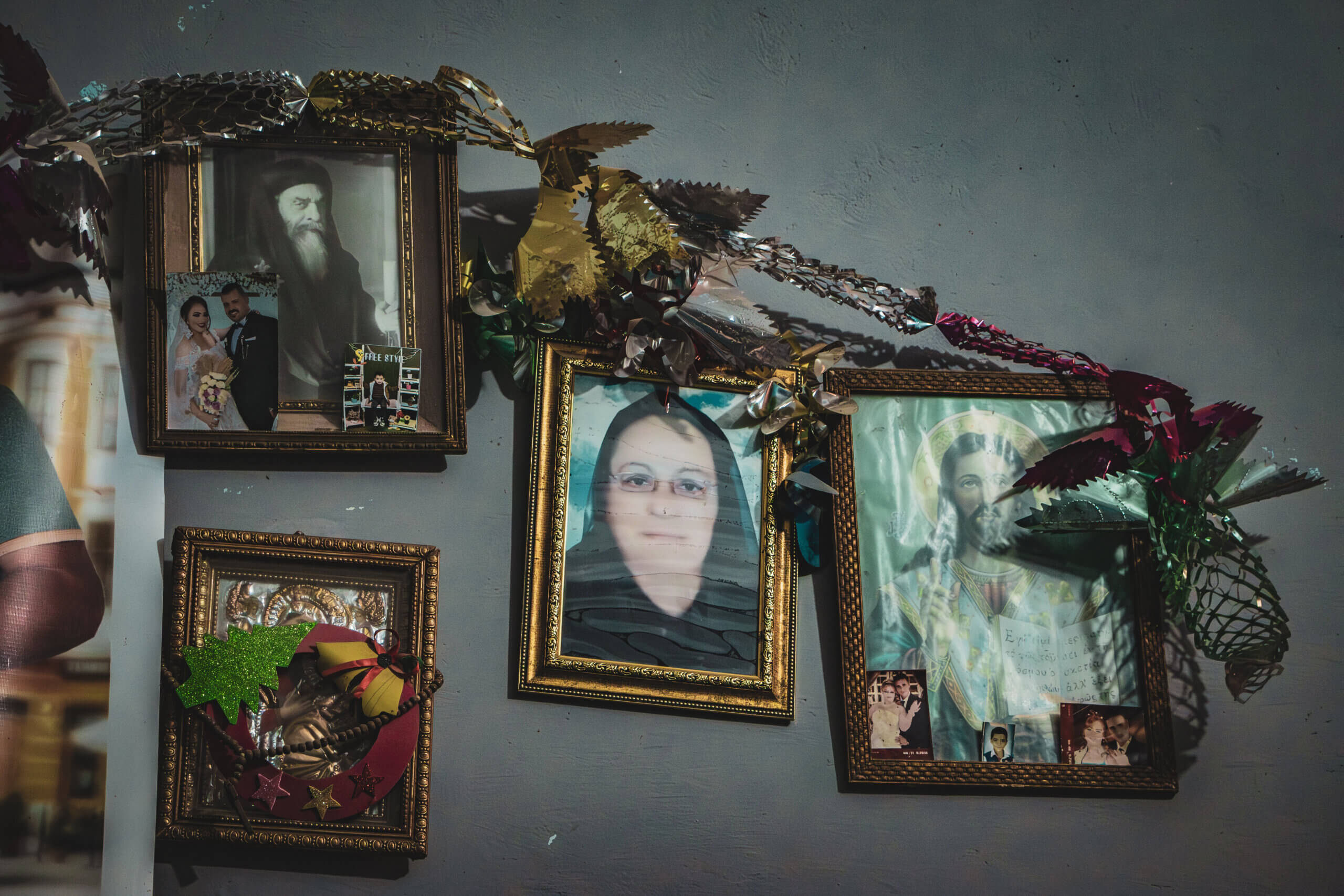
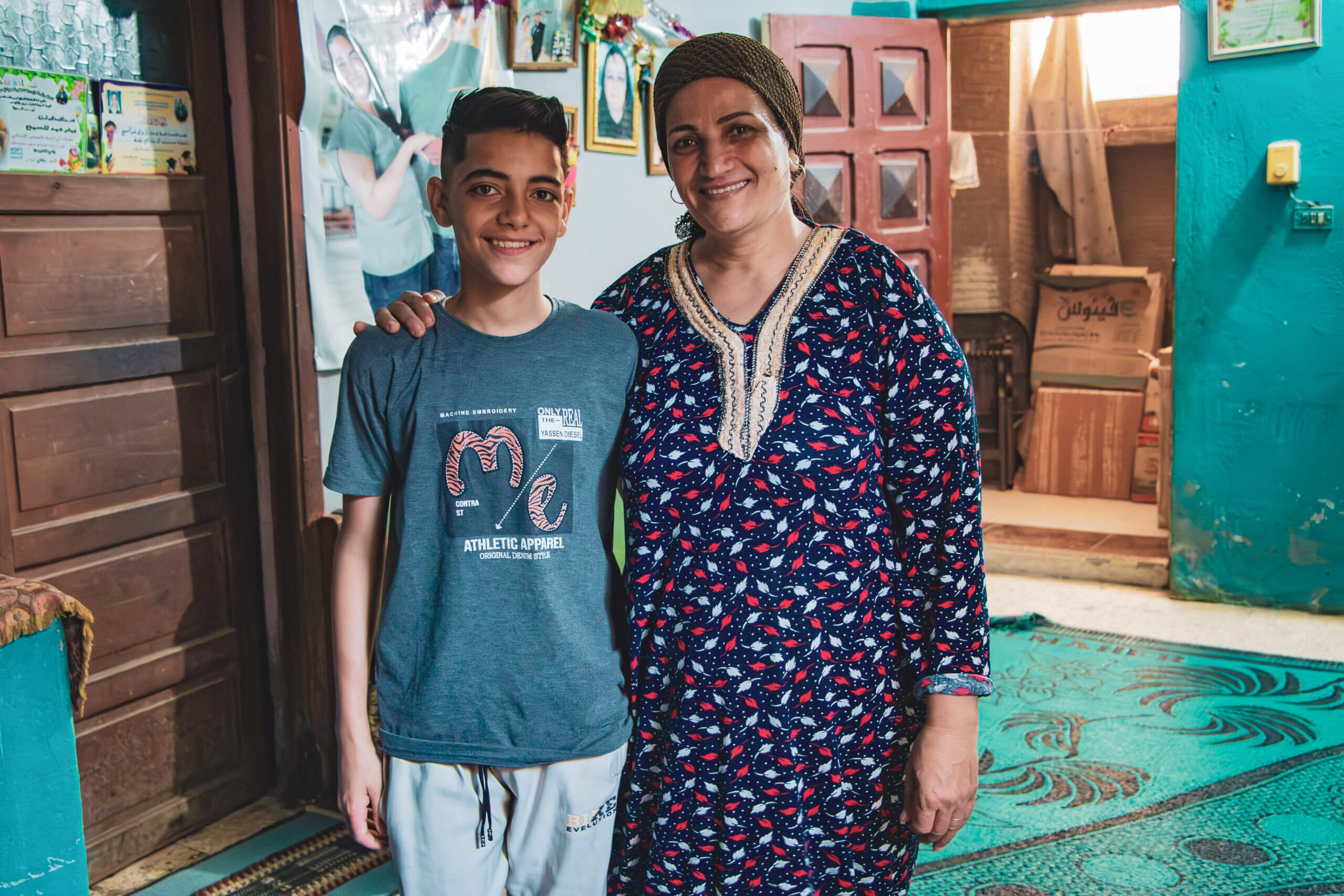
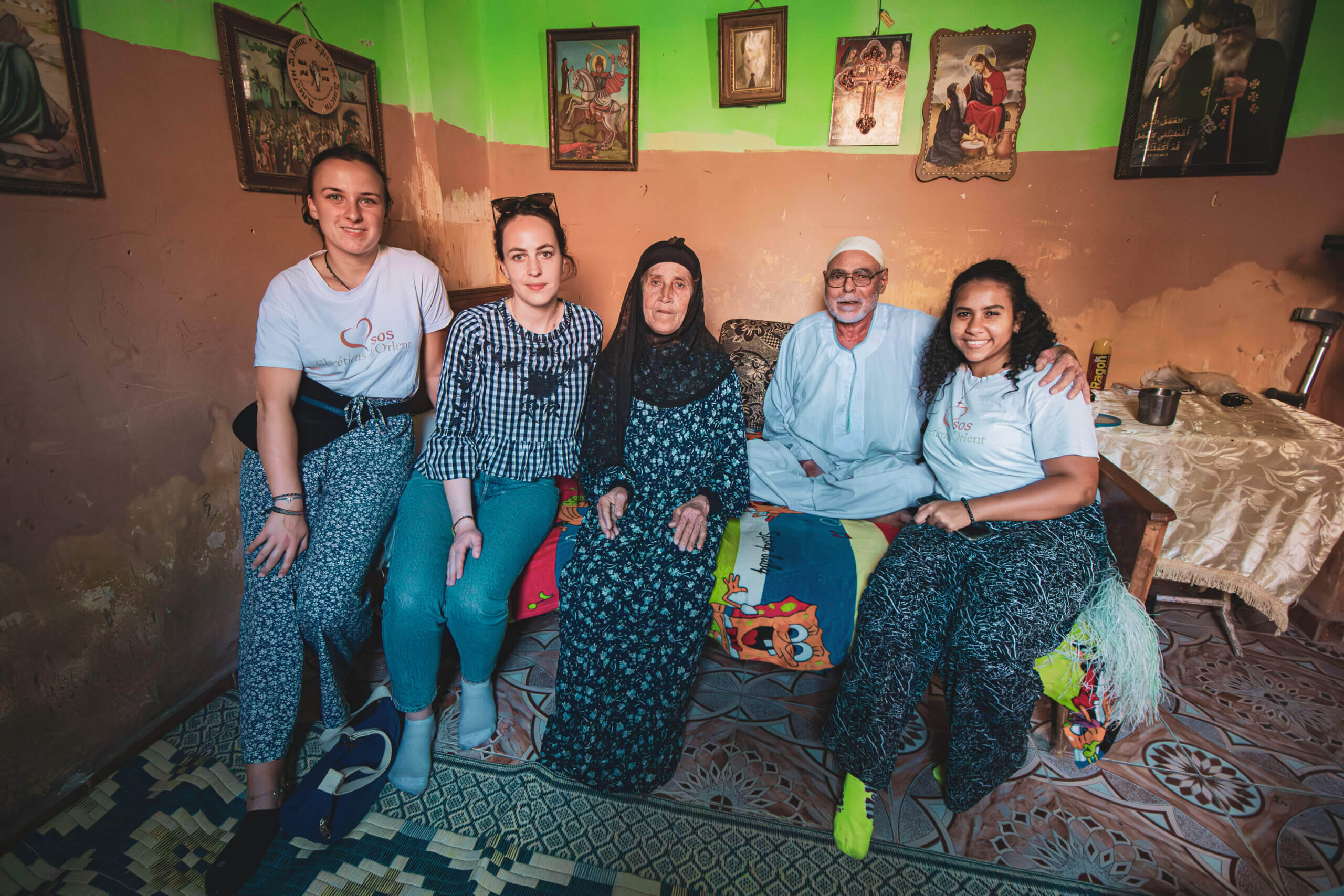
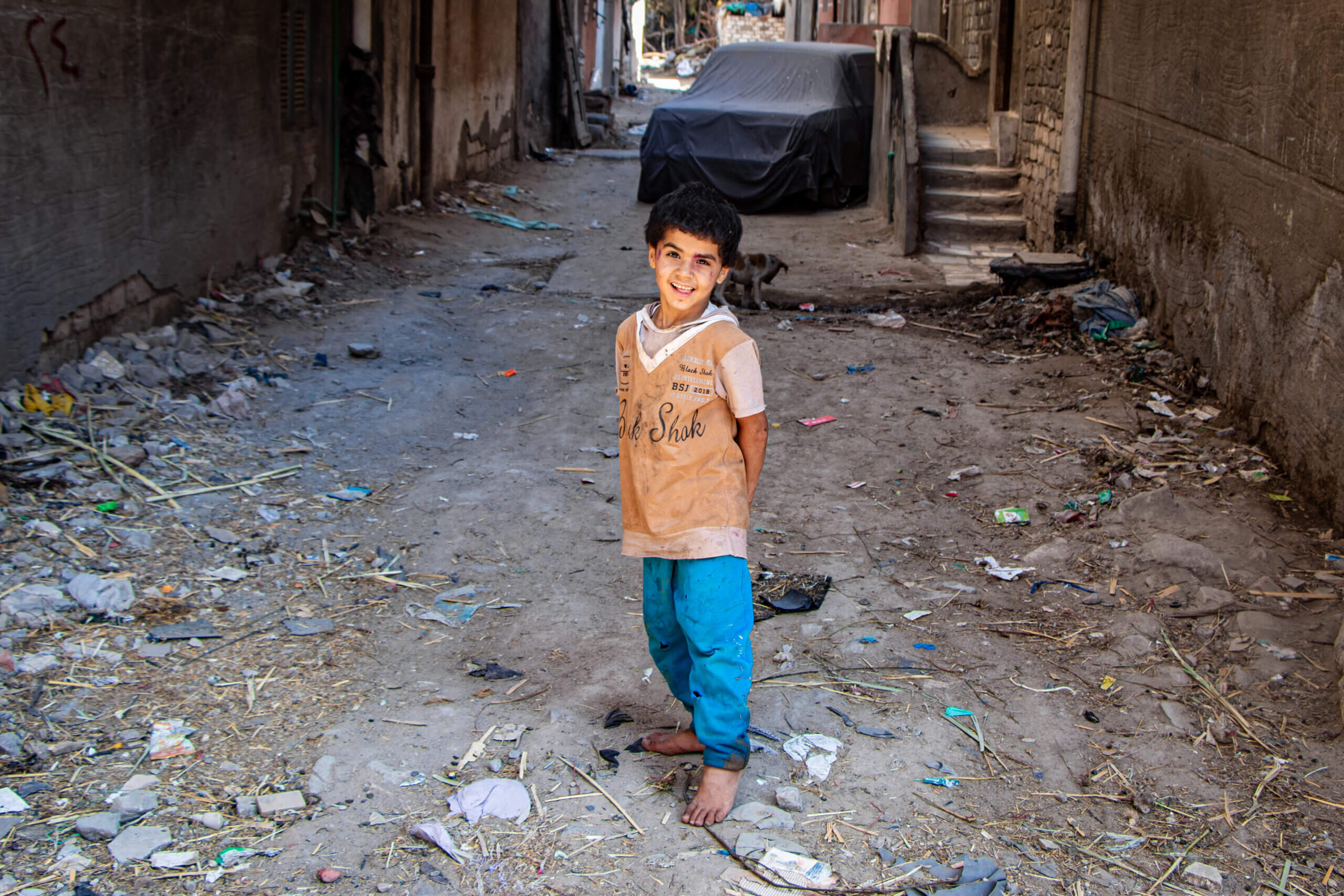
The volunteers donate food parcels to underprivileged families in the village of Abis.
“On the afternoon, with our arms full of parcels prepared the day before – rice, pasta, flour, sugar, salt, oil, tea, etc. – we set off along the dirt paths of this rural village, guided by a parishioner. These basic necessities will enable the families to cook traditional dishes, even during the fasting period of Lent.
A warm welcome at every house. A widow opens her door to us: her home is dark and modest, but her smile lights up the room. She tells us about her life, her children who have left for the city seeking work, and her attachment to the countryside. A little further on, a merry band of children welcome us into their grandmother’s home. In another house, an old couple receive us with gratitude, touched by this unexpected support.
A young mother of three children, abandoned by her husband, tells us how hard it is to survive monthly. Another, a widow, only leaves her house to go to church, while a third courageously looks after her home and a few animals, with the help of her children.
From one house to the next, the stories are repeated: isolated widows, large families living in dark, barely furnished rooms whose walls are decorated only with icons or photos of deceased relatives. And always the same welcome.
The children look forward to every visit. The logo of our organization on our clothes is familiar to them. They proudly show us their toys or bracelets, and exchange a few words of Arabic, in a touching spontaneity.
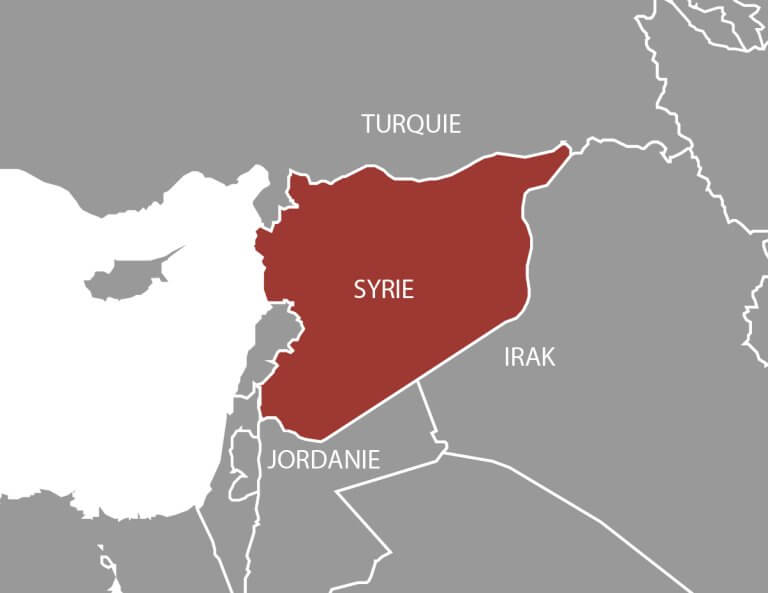

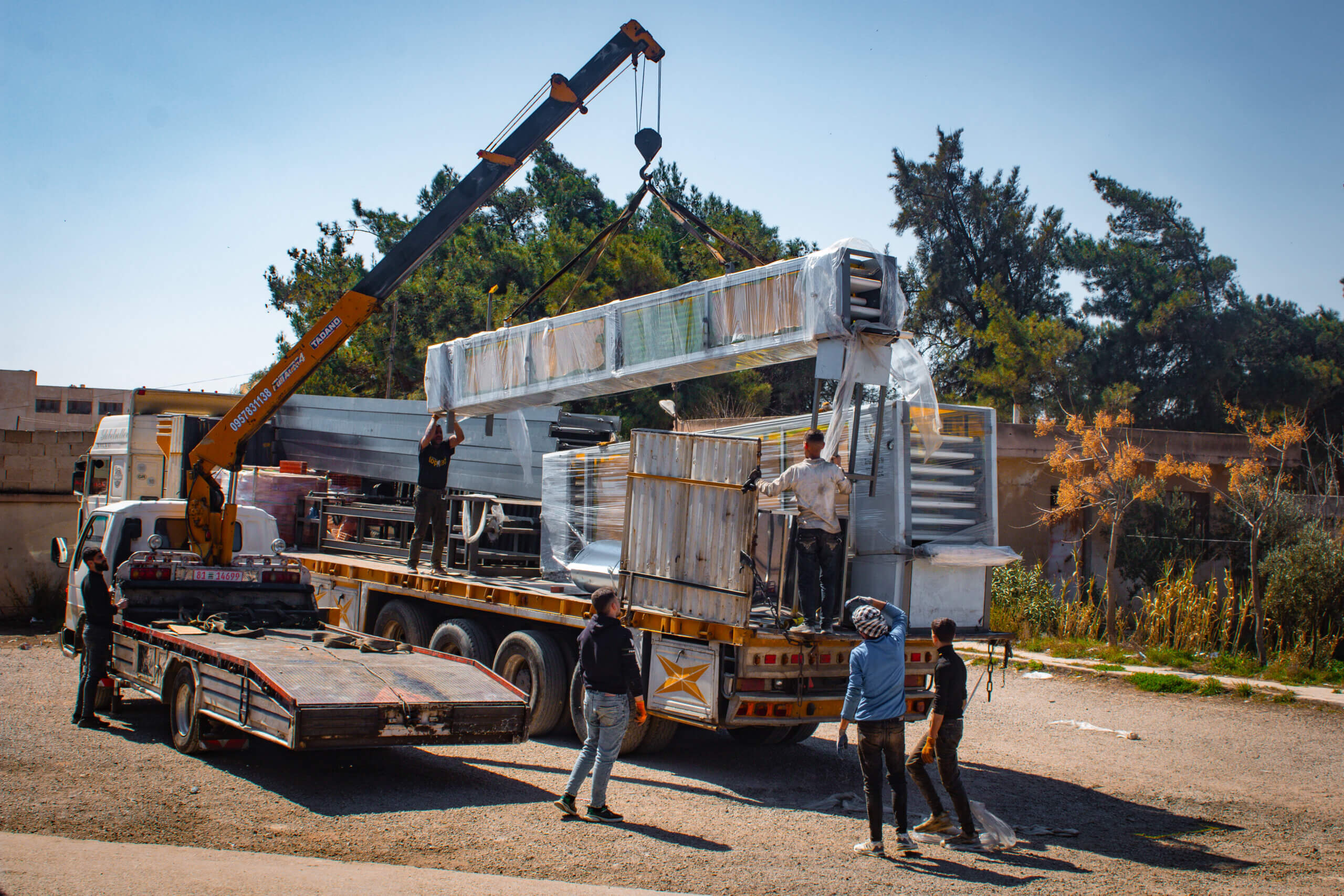
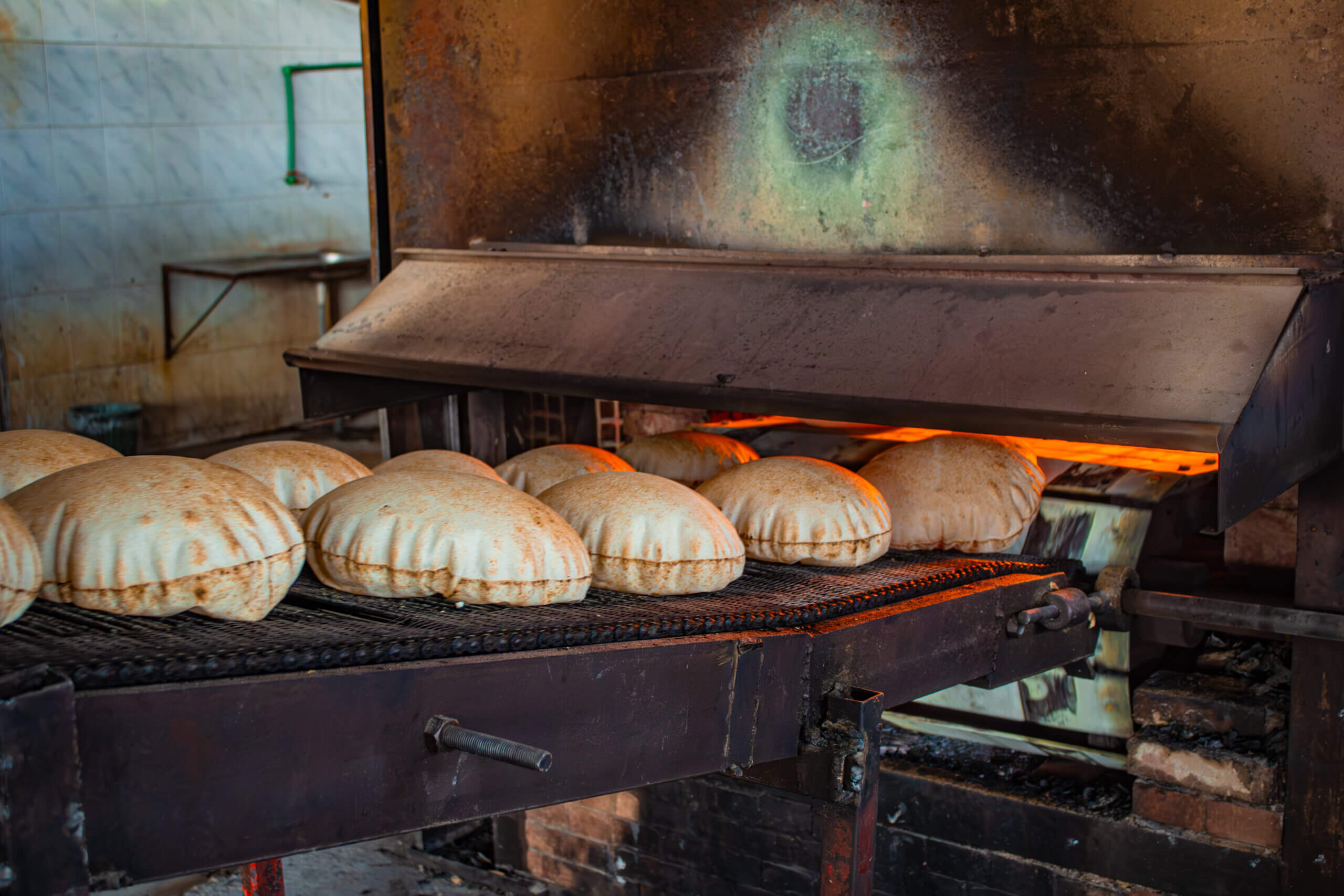
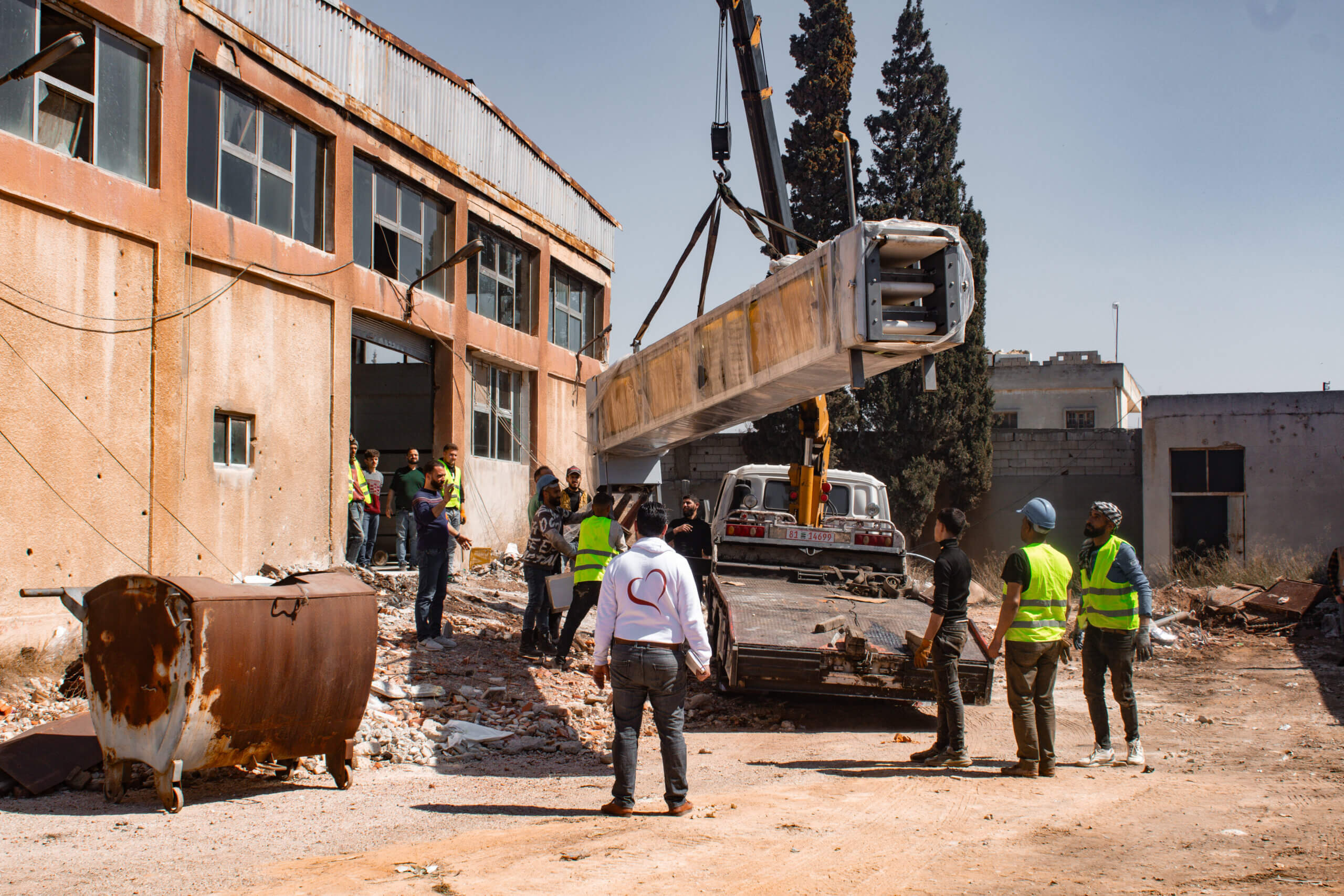
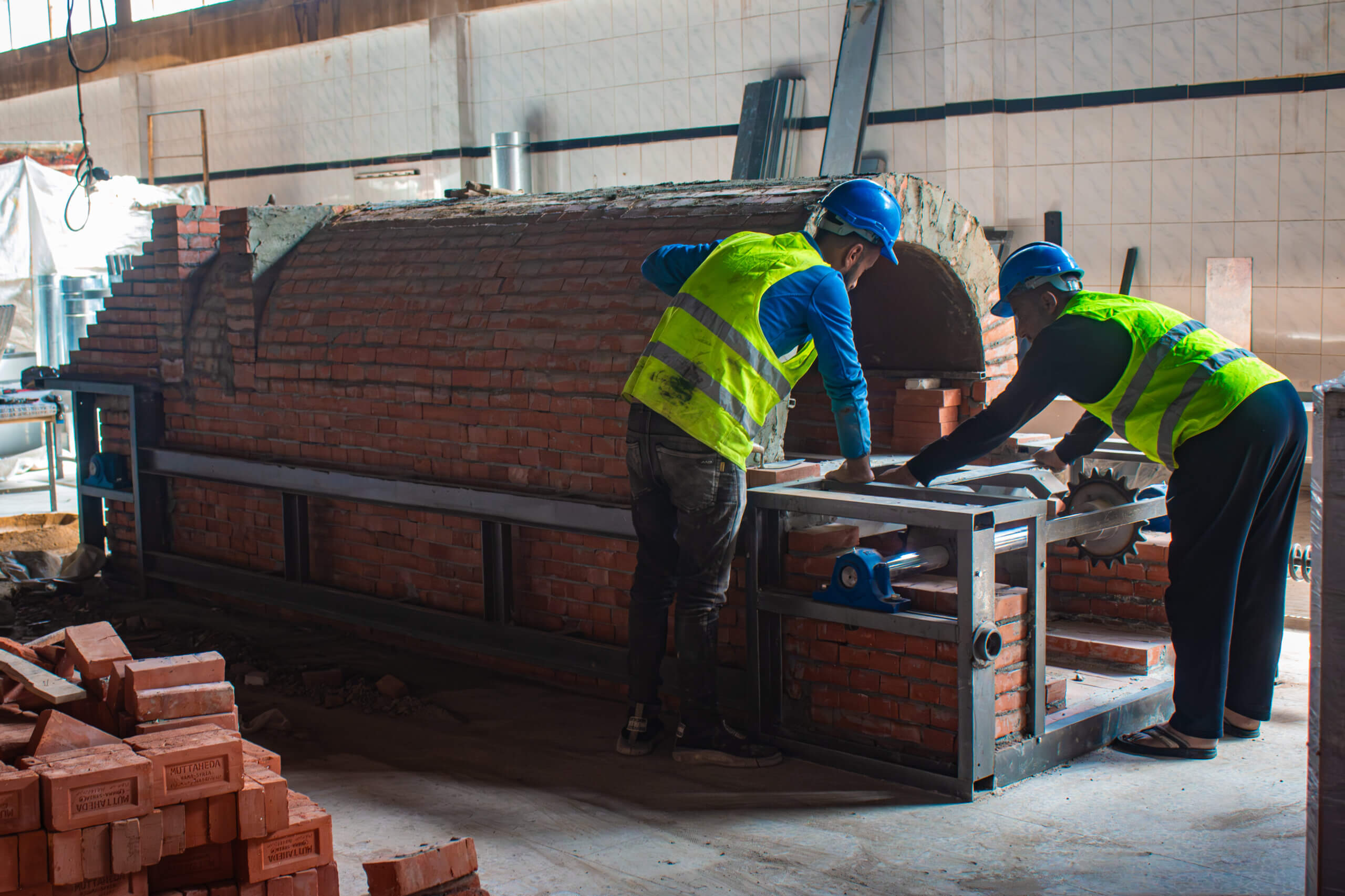
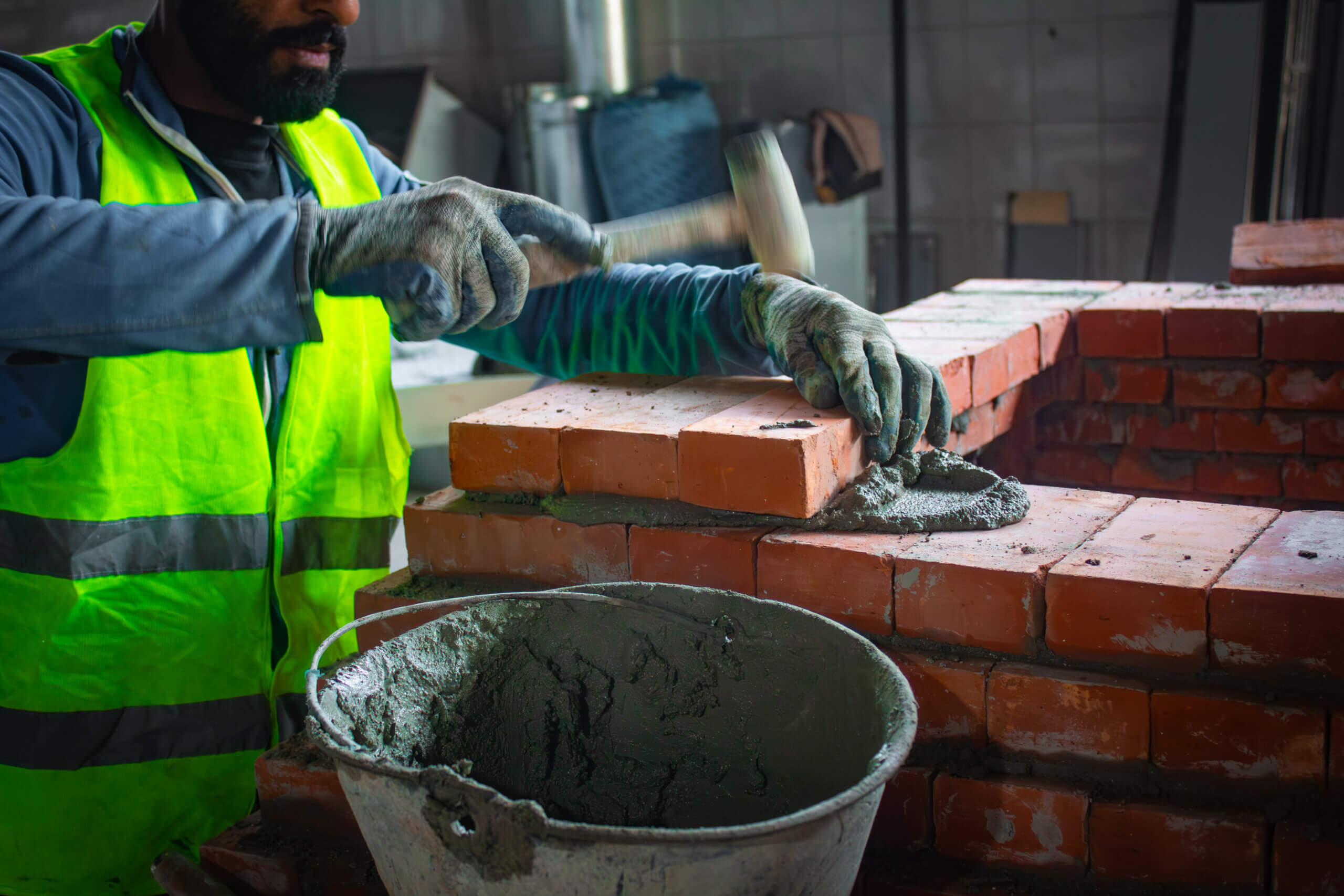
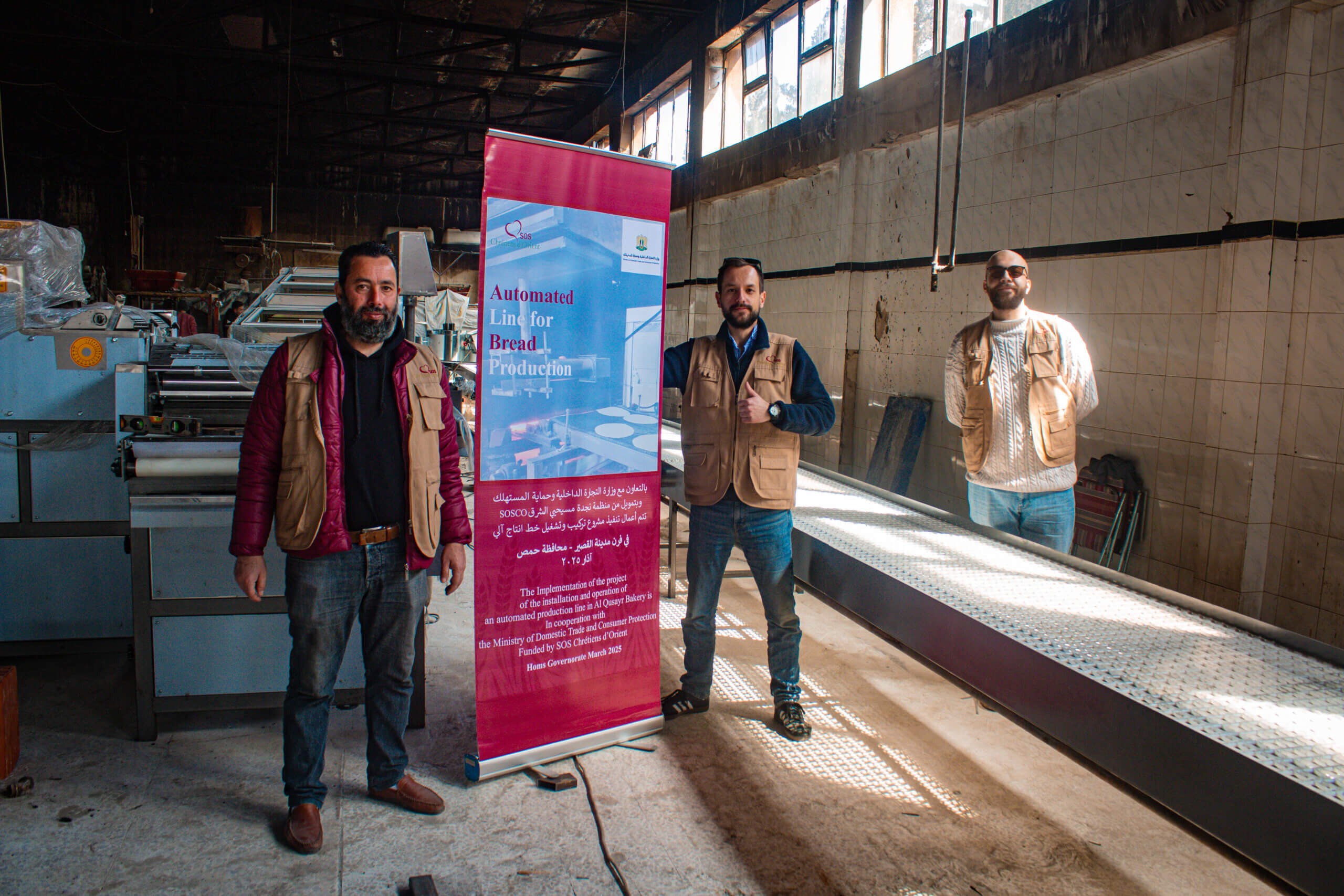
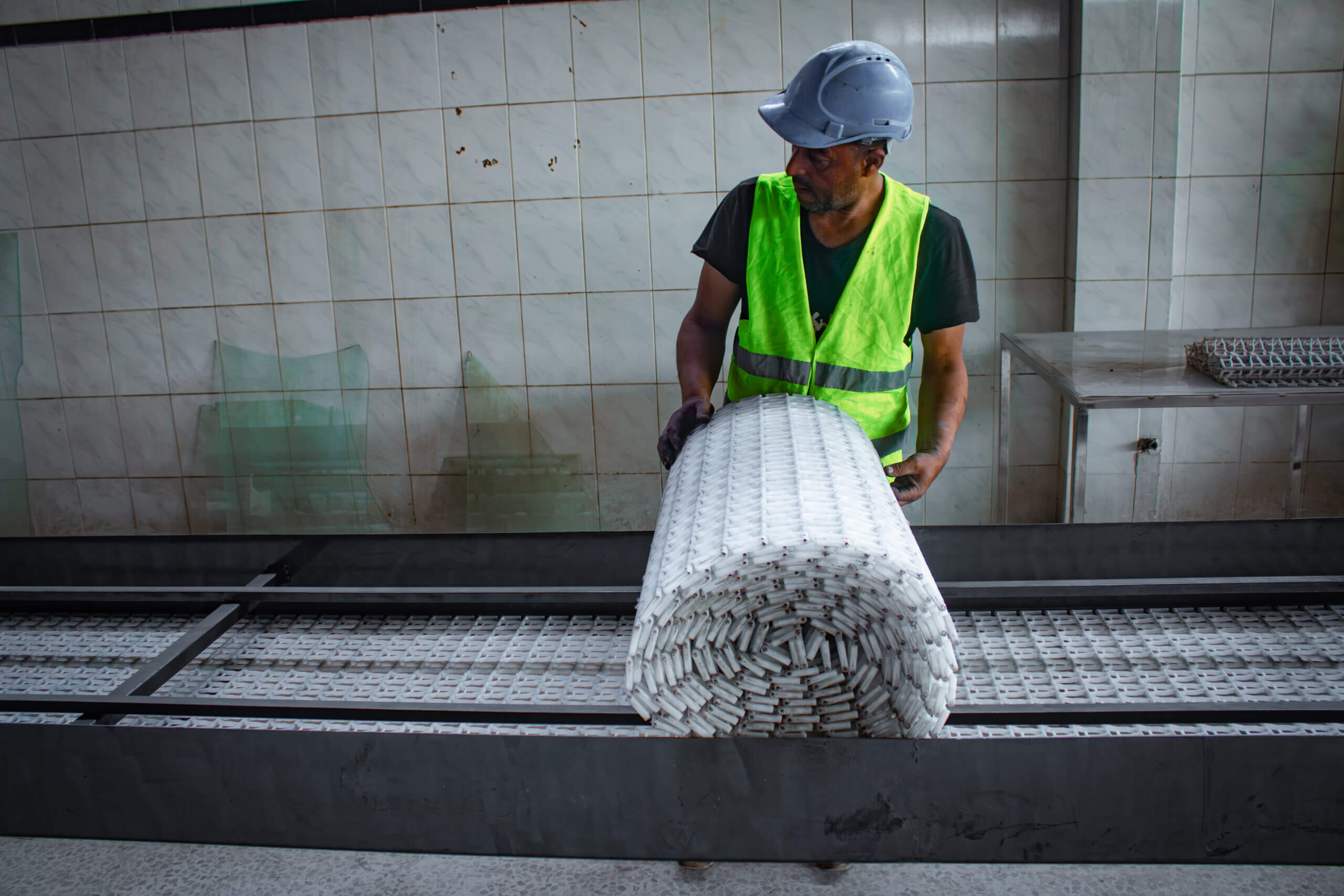
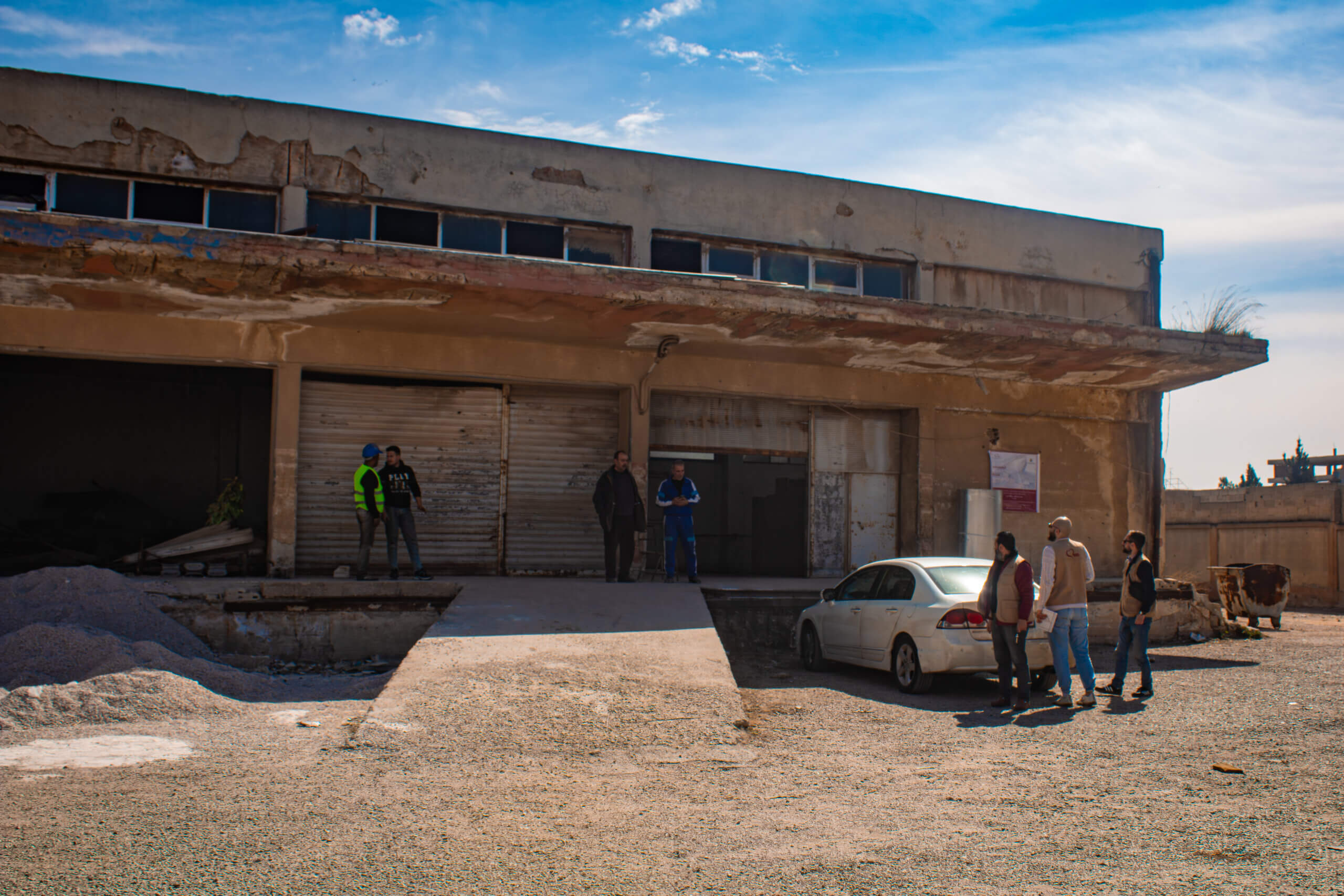
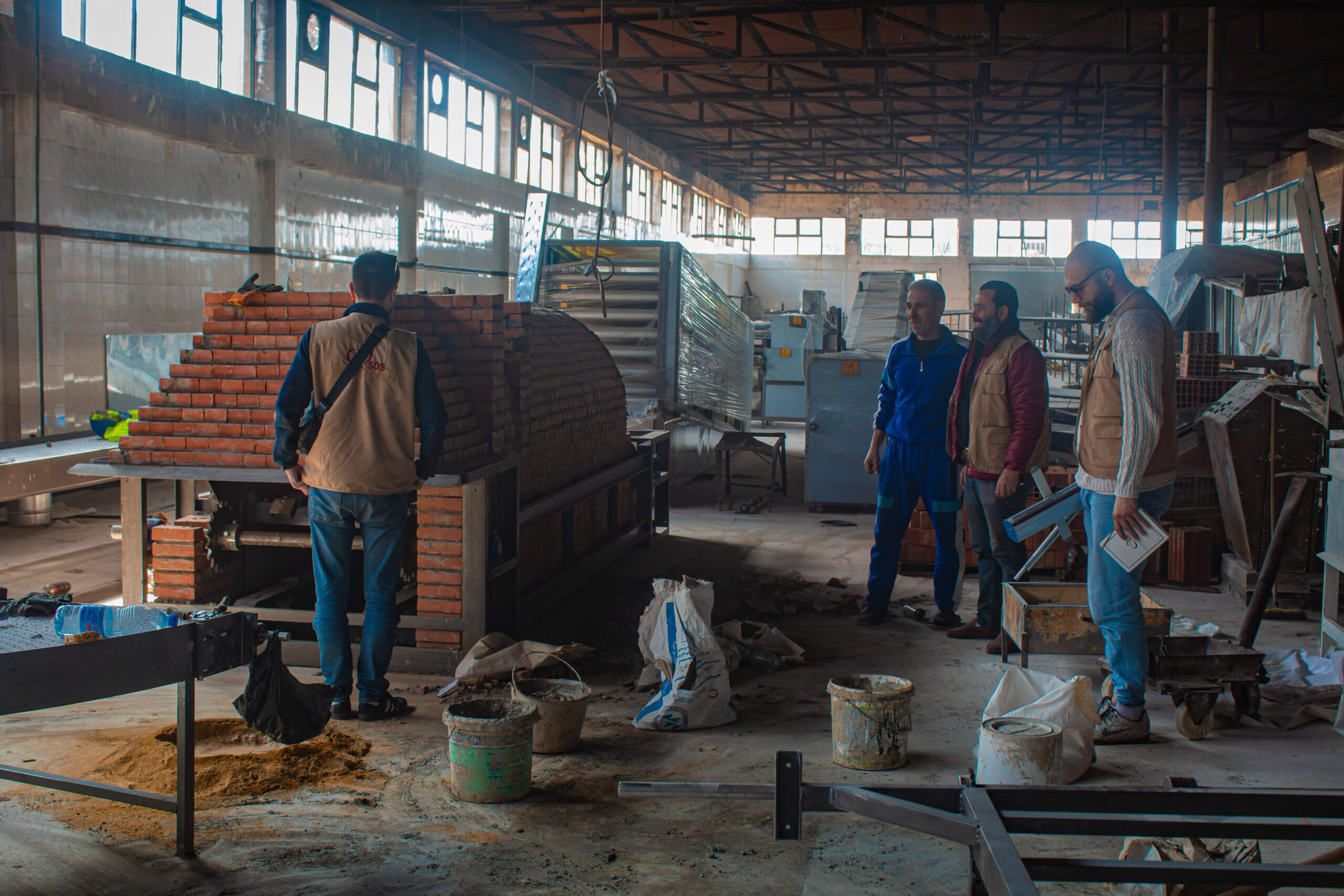
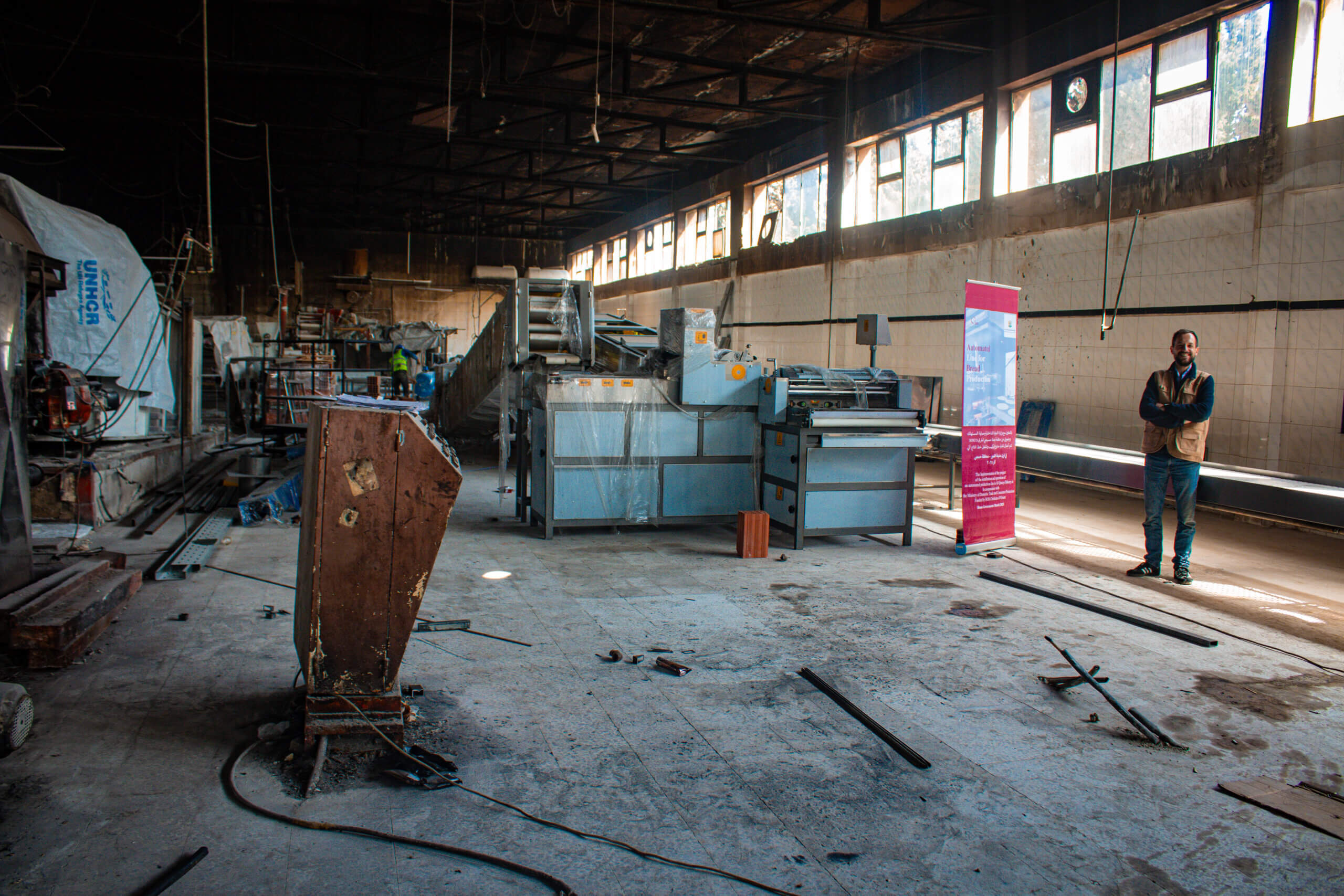
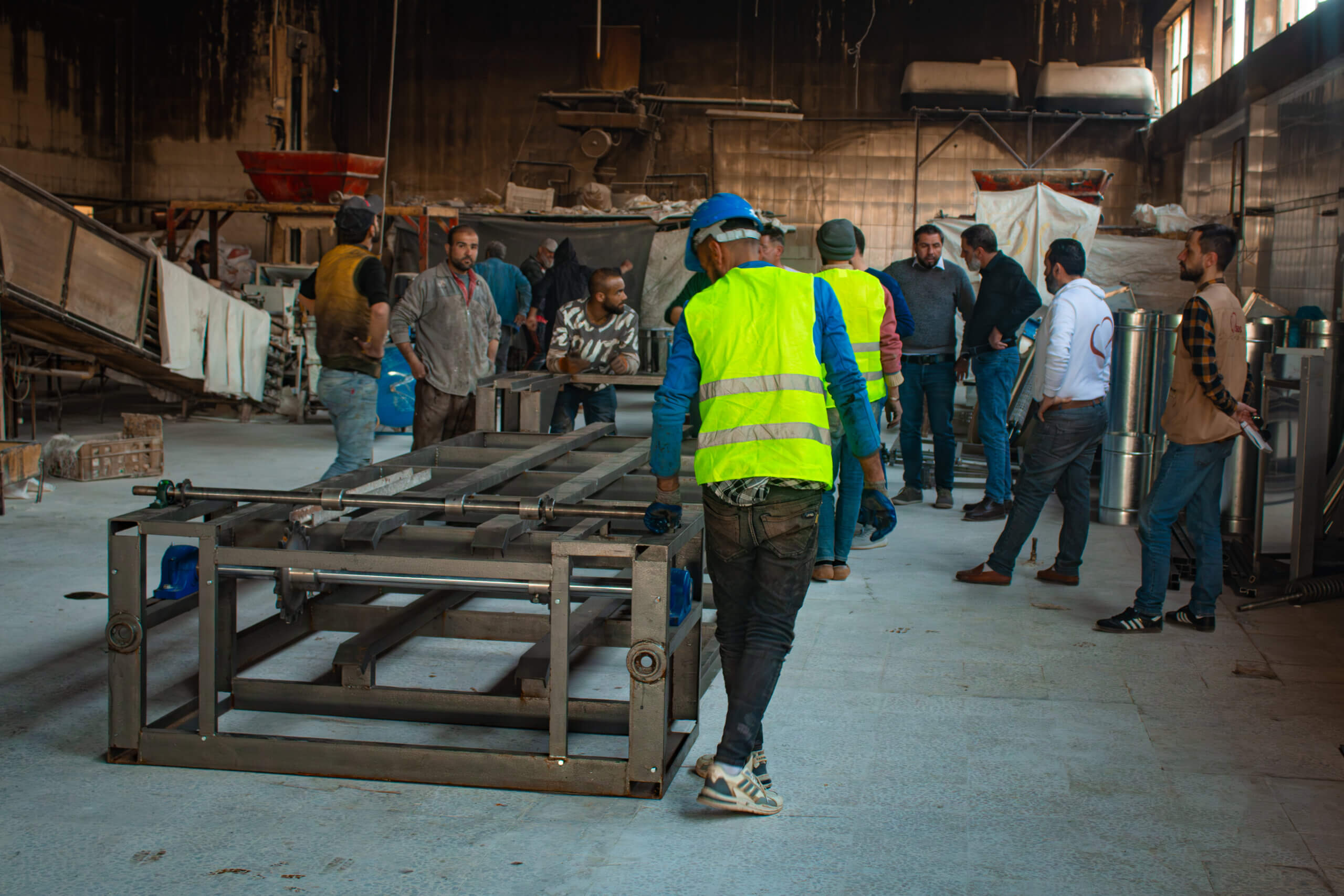
Located in the governorate of Homs, around ten kilometres from the Lebanese border, the town of Al Qussayr had a population of over 130,000 before the outbreak of the Syrian civil war in March 2011. It is home to a multi-faith population, including Sunni Muslims and Christians, alongside other religious minorities living in the region.
As everywhere in Syria, bread is the basis of daily nutrition. It is produced in traditional or industrial bakeries, which are able to meet the high demand. Al Qussayr already had an industrial bakery which, before 2011, needed 18 tonnes of flour a day to operate at full capacity. But the war hit the site hard, reducing its production capacity to 10 tonnes a day.
Aware of this situation, SOS Chrétiens d’Orient decided to take action by financing the installation of a new production line. The project has a number of objectives: firstly, to double production capacity in order to meet growing demand, against a backdrop of mass returns of Syrian refugees from Lebanon. The expansion will also create new jobs: at present, 32 people, including one with a disability, work in the bakery every day.
Since last December, the return of thousands of Syrians has increased the pressure on the existing infrastructure. In partnership with the Syrian Ministry of Internal Trade and Consumer Protection, SOS Chrétiens d’Orient has therefore set up a new production line next to the old one.
The enthusiasm generated by this project bears witness to the urgent need for action to strengthen the capacity of local agri-food structures. Food security, along with energy security, physical security and access to education, is one of the essential pillars for the sustainable return of refugees and the reconstruction of the country.